Understanding Business Concepts and Theories
VerifiedAdded on 2020/06/05
|19
|5785
|250
AI Summary
This assignment explores fundamental business concepts and theories drawn from diverse disciplines. It delves into topics such as organizational modes for open innovation, strategic management, leadership styles, human resource development, and curriculum design. The materials cover aspects of social research methods, pharmaceutical manufacturing, health economics, and the global financial crisis. Students are expected to demonstrate a comprehensive understanding of these concepts and their application in various business contexts.
Contribute Materials
Your contribution can guide someone’s learning journey. Share your
documents today.
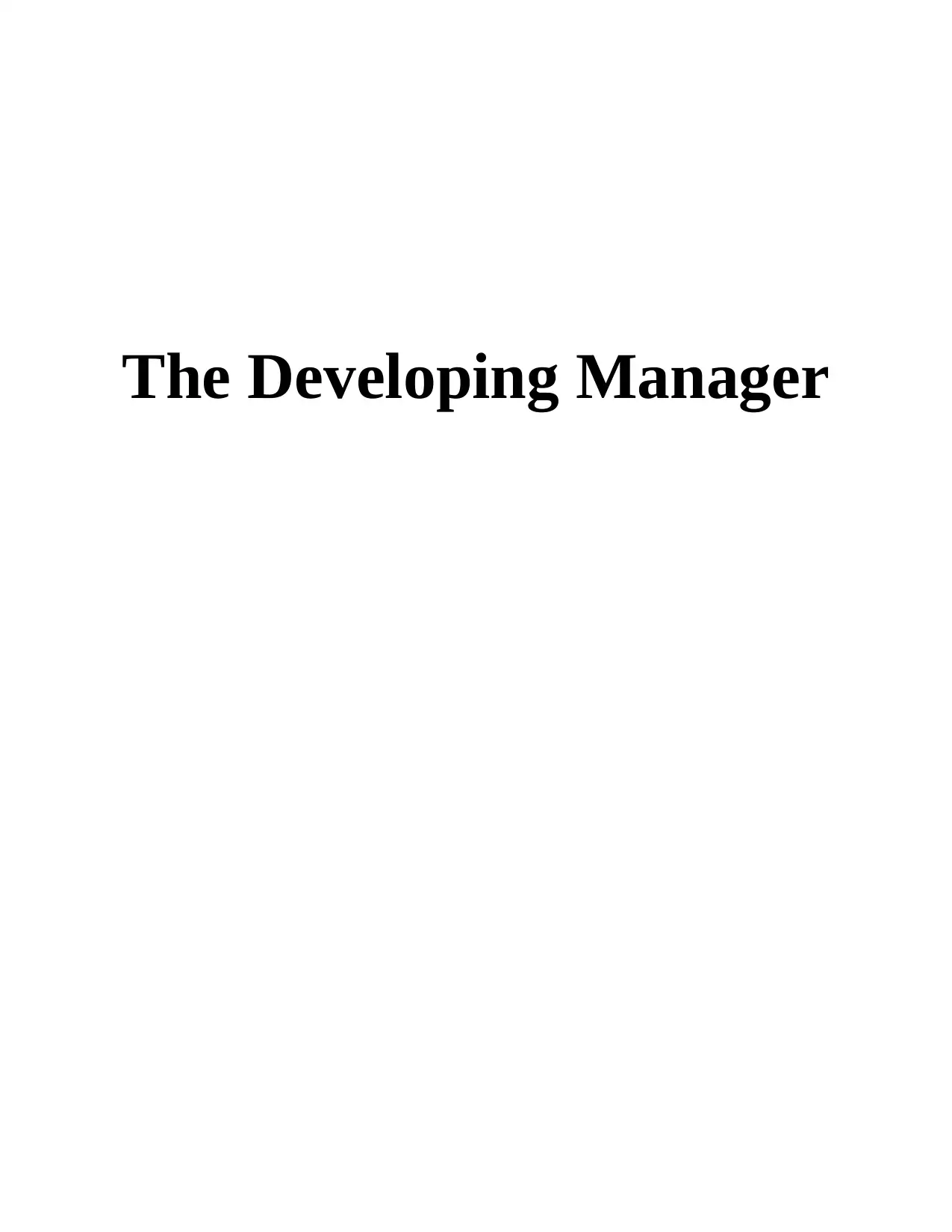
The Developing Manager
Secure Best Marks with AI Grader
Need help grading? Try our AI Grader for instant feedback on your assignments.
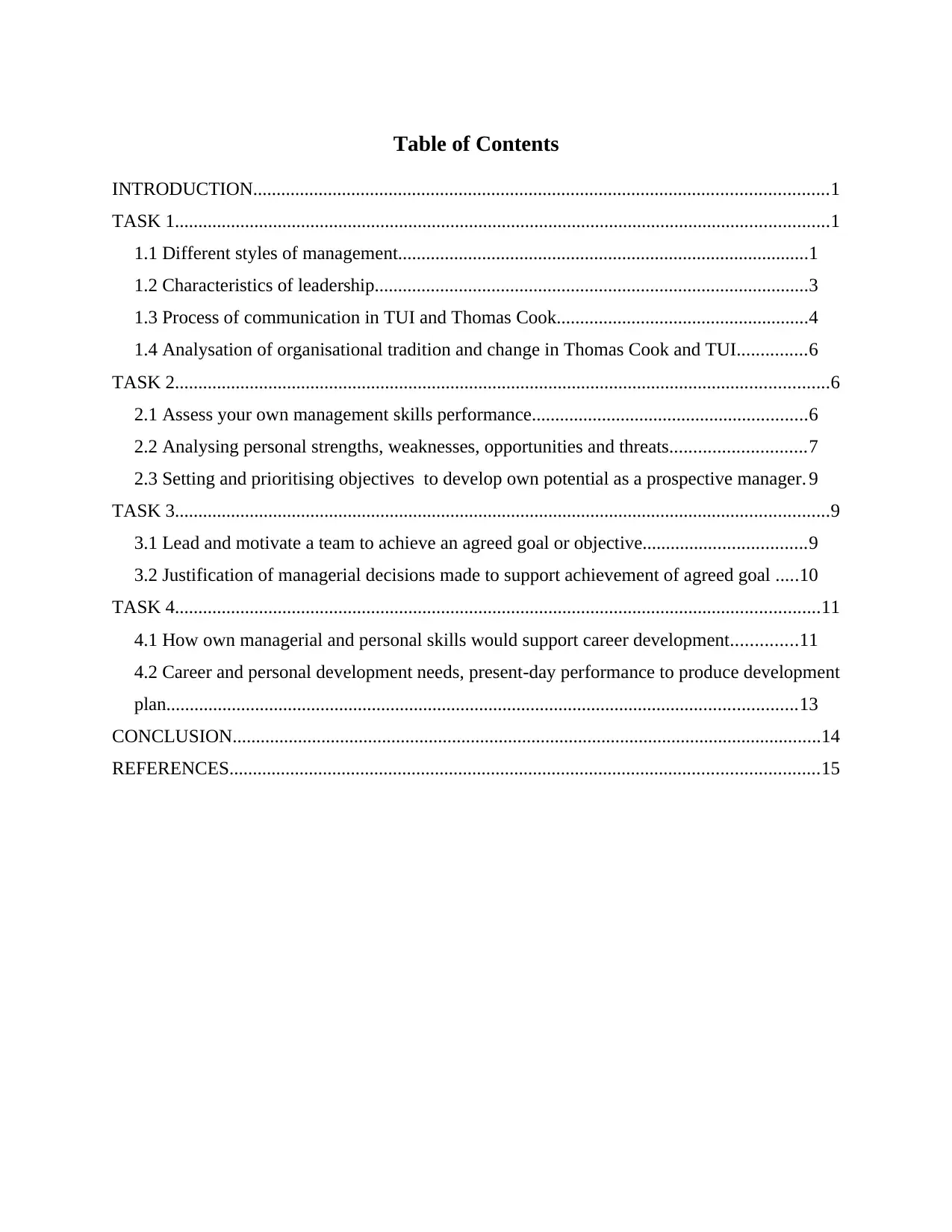
Table of Contents
INTRODUCTION...........................................................................................................................1
TASK 1............................................................................................................................................1
1.1 Different styles of management........................................................................................1
1.2 Characteristics of leadership.............................................................................................3
1.3 Process of communication in TUI and Thomas Cook......................................................4
1.4 Analysation of organisational tradition and change in Thomas Cook and TUI...............6
TASK 2............................................................................................................................................6
2.1 Assess your own management skills performance...........................................................6
2.2 Analysing personal strengths, weaknesses, opportunities and threats.............................7
2.3 Setting and prioritising objectives to develop own potential as a prospective manager. 9
TASK 3............................................................................................................................................9
3.1 Lead and motivate a team to achieve an agreed goal or objective...................................9
3.2 Justification of managerial decisions made to support achievement of agreed goal .....10
TASK 4..........................................................................................................................................11
4.1 How own managerial and personal skills would support career development..............11
4.2 Career and personal development needs, present-day performance to produce development
plan.......................................................................................................................................13
CONCLUSION..............................................................................................................................14
REFERENCES..............................................................................................................................15
INTRODUCTION...........................................................................................................................1
TASK 1............................................................................................................................................1
1.1 Different styles of management........................................................................................1
1.2 Characteristics of leadership.............................................................................................3
1.3 Process of communication in TUI and Thomas Cook......................................................4
1.4 Analysation of organisational tradition and change in Thomas Cook and TUI...............6
TASK 2............................................................................................................................................6
2.1 Assess your own management skills performance...........................................................6
2.2 Analysing personal strengths, weaknesses, opportunities and threats.............................7
2.3 Setting and prioritising objectives to develop own potential as a prospective manager. 9
TASK 3............................................................................................................................................9
3.1 Lead and motivate a team to achieve an agreed goal or objective...................................9
3.2 Justification of managerial decisions made to support achievement of agreed goal .....10
TASK 4..........................................................................................................................................11
4.1 How own managerial and personal skills would support career development..............11
4.2 Career and personal development needs, present-day performance to produce development
plan.......................................................................................................................................13
CONCLUSION..............................................................................................................................14
REFERENCES..............................................................................................................................15
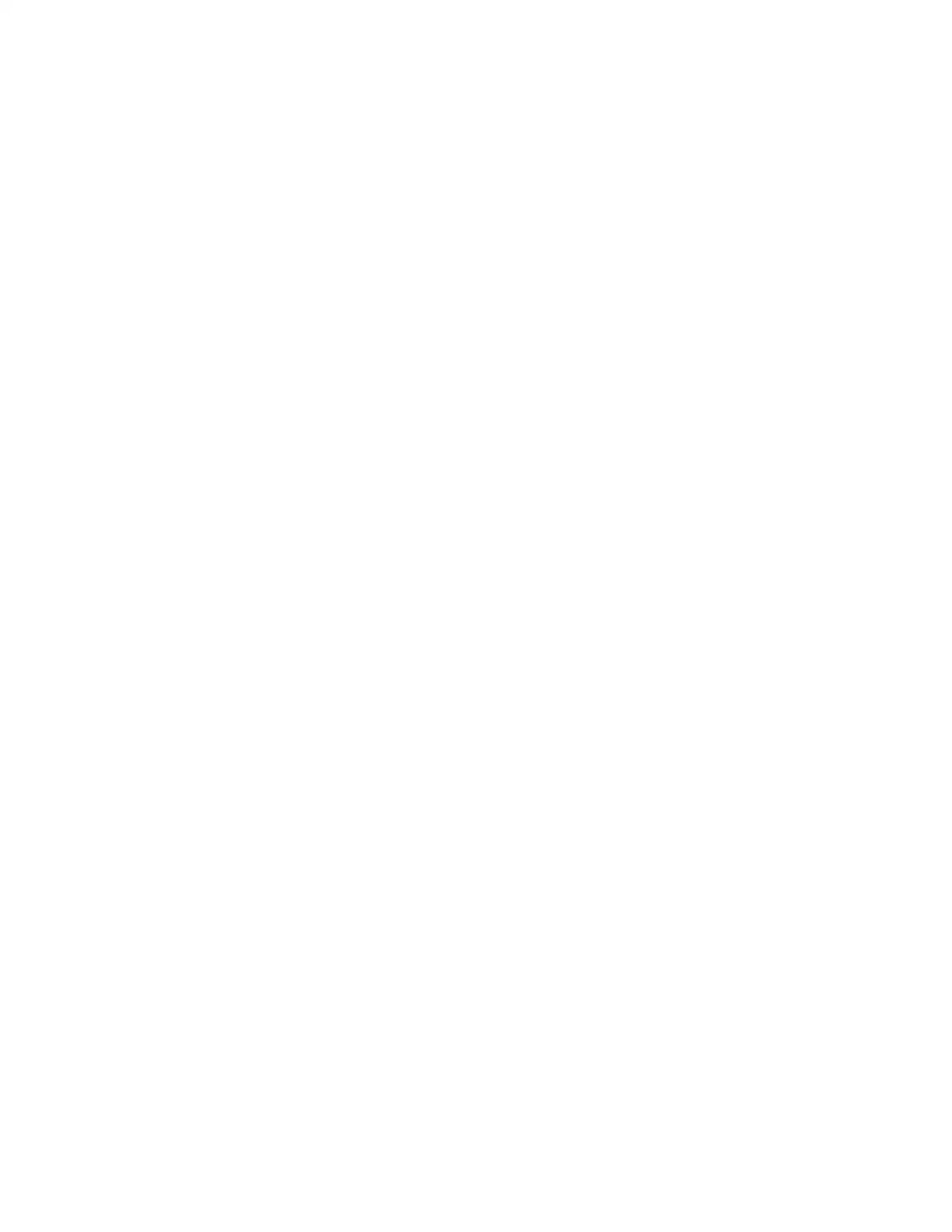
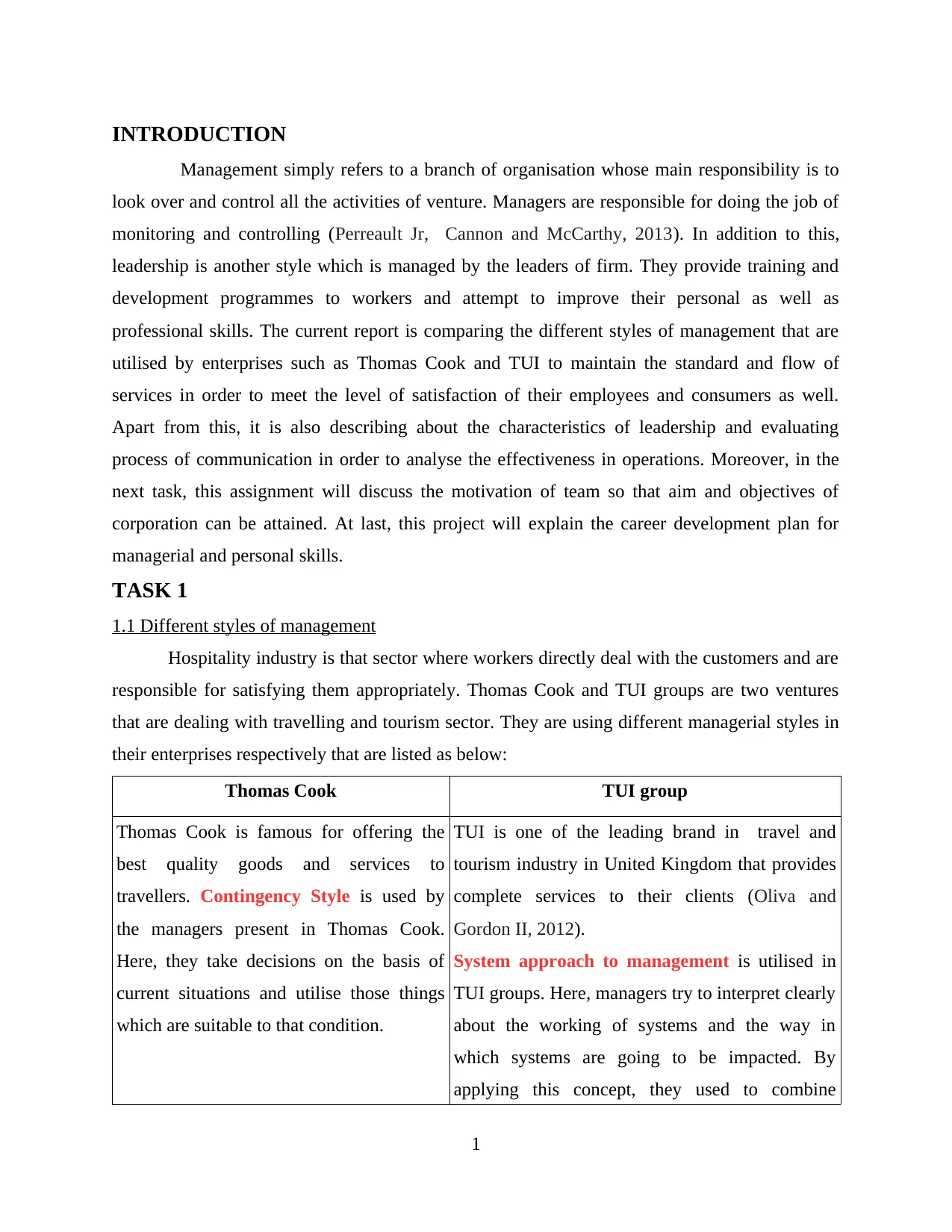
INTRODUCTION
Management simply refers to a branch of organisation whose main responsibility is to
look over and control all the activities of venture. Managers are responsible for doing the job of
monitoring and controlling (Perreault Jr, Cannon and McCarthy, 2013). In addition to this,
leadership is another style which is managed by the leaders of firm. They provide training and
development programmes to workers and attempt to improve their personal as well as
professional skills. The current report is comparing the different styles of management that are
utilised by enterprises such as Thomas Cook and TUI to maintain the standard and flow of
services in order to meet the level of satisfaction of their employees and consumers as well.
Apart from this, it is also describing about the characteristics of leadership and evaluating
process of communication in order to analyse the effectiveness in operations. Moreover, in the
next task, this assignment will discuss the motivation of team so that aim and objectives of
corporation can be attained. At last, this project will explain the career development plan for
managerial and personal skills.
TASK 1
1.1 Different styles of management
Hospitality industry is that sector where workers directly deal with the customers and are
responsible for satisfying them appropriately. Thomas Cook and TUI groups are two ventures
that are dealing with travelling and tourism sector. They are using different managerial styles in
their enterprises respectively that are listed as below:
Thomas Cook TUI group
Thomas Cook is famous for offering the
best quality goods and services to
travellers. Contingency Style is used by
the managers present in Thomas Cook.
Here, they take decisions on the basis of
current situations and utilise those things
which are suitable to that condition.
TUI is one of the leading brand in travel and
tourism industry in United Kingdom that provides
complete services to their clients (Oliva and
Gordon II, 2012).
System approach to management is utilised in
TUI groups. Here, managers try to interpret clearly
about the working of systems and the way in
which systems are going to be impacted. By
applying this concept, they used to combine
1
Management simply refers to a branch of organisation whose main responsibility is to
look over and control all the activities of venture. Managers are responsible for doing the job of
monitoring and controlling (Perreault Jr, Cannon and McCarthy, 2013). In addition to this,
leadership is another style which is managed by the leaders of firm. They provide training and
development programmes to workers and attempt to improve their personal as well as
professional skills. The current report is comparing the different styles of management that are
utilised by enterprises such as Thomas Cook and TUI to maintain the standard and flow of
services in order to meet the level of satisfaction of their employees and consumers as well.
Apart from this, it is also describing about the characteristics of leadership and evaluating
process of communication in order to analyse the effectiveness in operations. Moreover, in the
next task, this assignment will discuss the motivation of team so that aim and objectives of
corporation can be attained. At last, this project will explain the career development plan for
managerial and personal skills.
TASK 1
1.1 Different styles of management
Hospitality industry is that sector where workers directly deal with the customers and are
responsible for satisfying them appropriately. Thomas Cook and TUI groups are two ventures
that are dealing with travelling and tourism sector. They are using different managerial styles in
their enterprises respectively that are listed as below:
Thomas Cook TUI group
Thomas Cook is famous for offering the
best quality goods and services to
travellers. Contingency Style is used by
the managers present in Thomas Cook.
Here, they take decisions on the basis of
current situations and utilise those things
which are suitable to that condition.
TUI is one of the leading brand in travel and
tourism industry in United Kingdom that provides
complete services to their clients (Oliva and
Gordon II, 2012).
System approach to management is utilised in
TUI groups. Here, managers try to interpret clearly
about the working of systems and the way in
which systems are going to be impacted. By
applying this concept, they used to combine
1
Secure Best Marks with AI Grader
Need help grading? Try our AI Grader for instant feedback on your assignments.
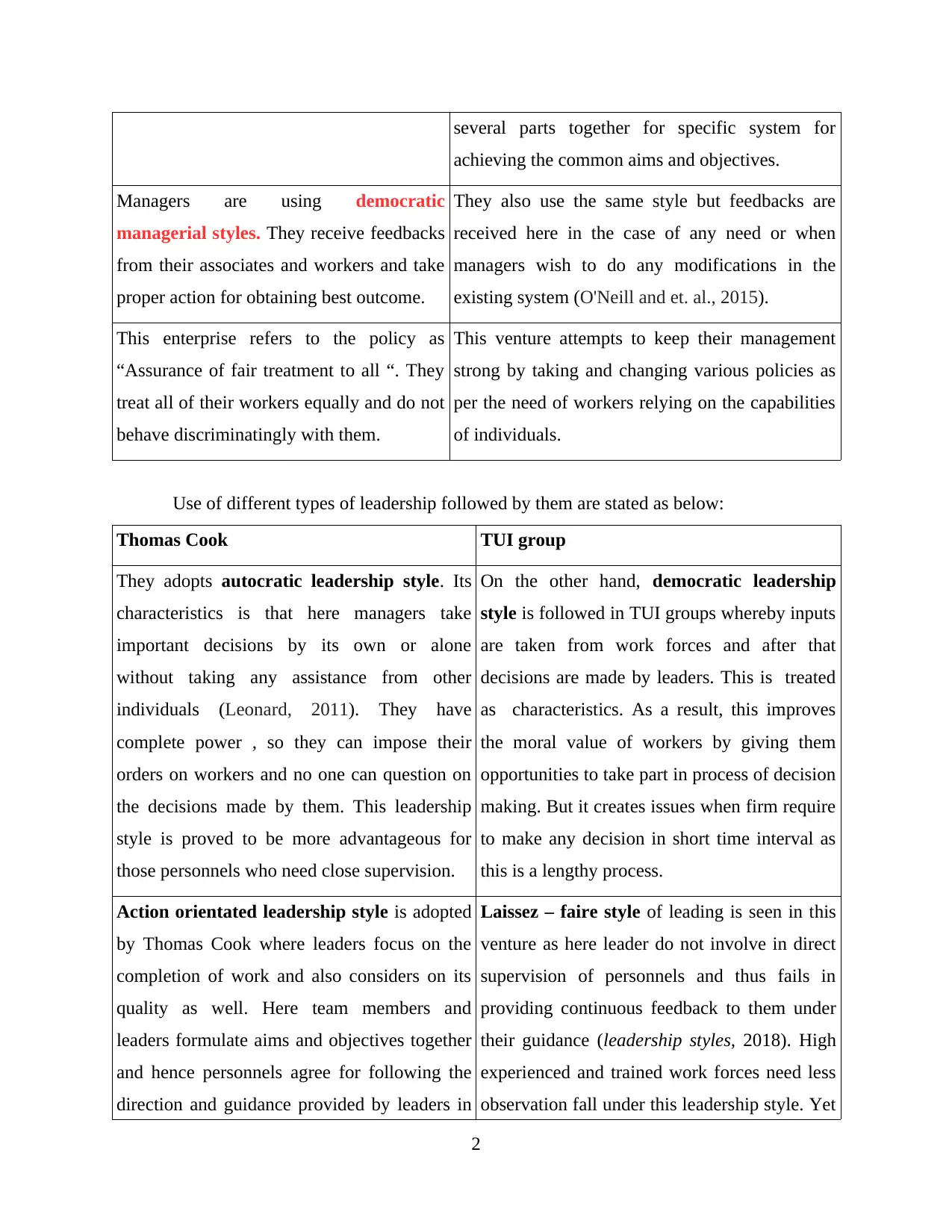
several parts together for specific system for
achieving the common aims and objectives.
Managers are using democratic
managerial styles. They receive feedbacks
from their associates and workers and take
proper action for obtaining best outcome.
They also use the same style but feedbacks are
received here in the case of any need or when
managers wish to do any modifications in the
existing system (O'Neill and et. al., 2015).
This enterprise refers to the policy as
“Assurance of fair treatment to all “. They
treat all of their workers equally and do not
behave discriminatingly with them.
This venture attempts to keep their management
strong by taking and changing various policies as
per the need of workers relying on the capabilities
of individuals.
Use of different types of leadership followed by them are stated as below:
Thomas Cook TUI group
They adopts autocratic leadership style. Its
characteristics is that here managers take
important decisions by its own or alone
without taking any assistance from other
individuals (Leonard, 2011). They have
complete power , so they can impose their
orders on workers and no one can question on
the decisions made by them. This leadership
style is proved to be more advantageous for
those personnels who need close supervision.
On the other hand, democratic leadership
style is followed in TUI groups whereby inputs
are taken from work forces and after that
decisions are made by leaders. This is treated
as characteristics. As a result, this improves
the moral value of workers by giving them
opportunities to take part in process of decision
making. But it creates issues when firm require
to make any decision in short time interval as
this is a lengthy process.
Action orientated leadership style is adopted
by Thomas Cook where leaders focus on the
completion of work and also considers on its
quality as well. Here team members and
leaders formulate aims and objectives together
and hence personnels agree for following the
direction and guidance provided by leaders in
Laissez – faire style of leading is seen in this
venture as here leader do not involve in direct
supervision of personnels and thus fails in
providing continuous feedback to them under
their guidance (leadership styles, 2018). High
experienced and trained work forces need less
observation fall under this leadership style. Yet
2
achieving the common aims and objectives.
Managers are using democratic
managerial styles. They receive feedbacks
from their associates and workers and take
proper action for obtaining best outcome.
They also use the same style but feedbacks are
received here in the case of any need or when
managers wish to do any modifications in the
existing system (O'Neill and et. al., 2015).
This enterprise refers to the policy as
“Assurance of fair treatment to all “. They
treat all of their workers equally and do not
behave discriminatingly with them.
This venture attempts to keep their management
strong by taking and changing various policies as
per the need of workers relying on the capabilities
of individuals.
Use of different types of leadership followed by them are stated as below:
Thomas Cook TUI group
They adopts autocratic leadership style. Its
characteristics is that here managers take
important decisions by its own or alone
without taking any assistance from other
individuals (Leonard, 2011). They have
complete power , so they can impose their
orders on workers and no one can question on
the decisions made by them. This leadership
style is proved to be more advantageous for
those personnels who need close supervision.
On the other hand, democratic leadership
style is followed in TUI groups whereby inputs
are taken from work forces and after that
decisions are made by leaders. This is treated
as characteristics. As a result, this improves
the moral value of workers by giving them
opportunities to take part in process of decision
making. But it creates issues when firm require
to make any decision in short time interval as
this is a lengthy process.
Action orientated leadership style is adopted
by Thomas Cook where leaders focus on the
completion of work and also considers on its
quality as well. Here team members and
leaders formulate aims and objectives together
and hence personnels agree for following the
direction and guidance provided by leaders in
Laissez – faire style of leading is seen in this
venture as here leader do not involve in direct
supervision of personnels and thus fails in
providing continuous feedback to them under
their guidance (leadership styles, 2018). High
experienced and trained work forces need less
observation fall under this leadership style. Yet
2
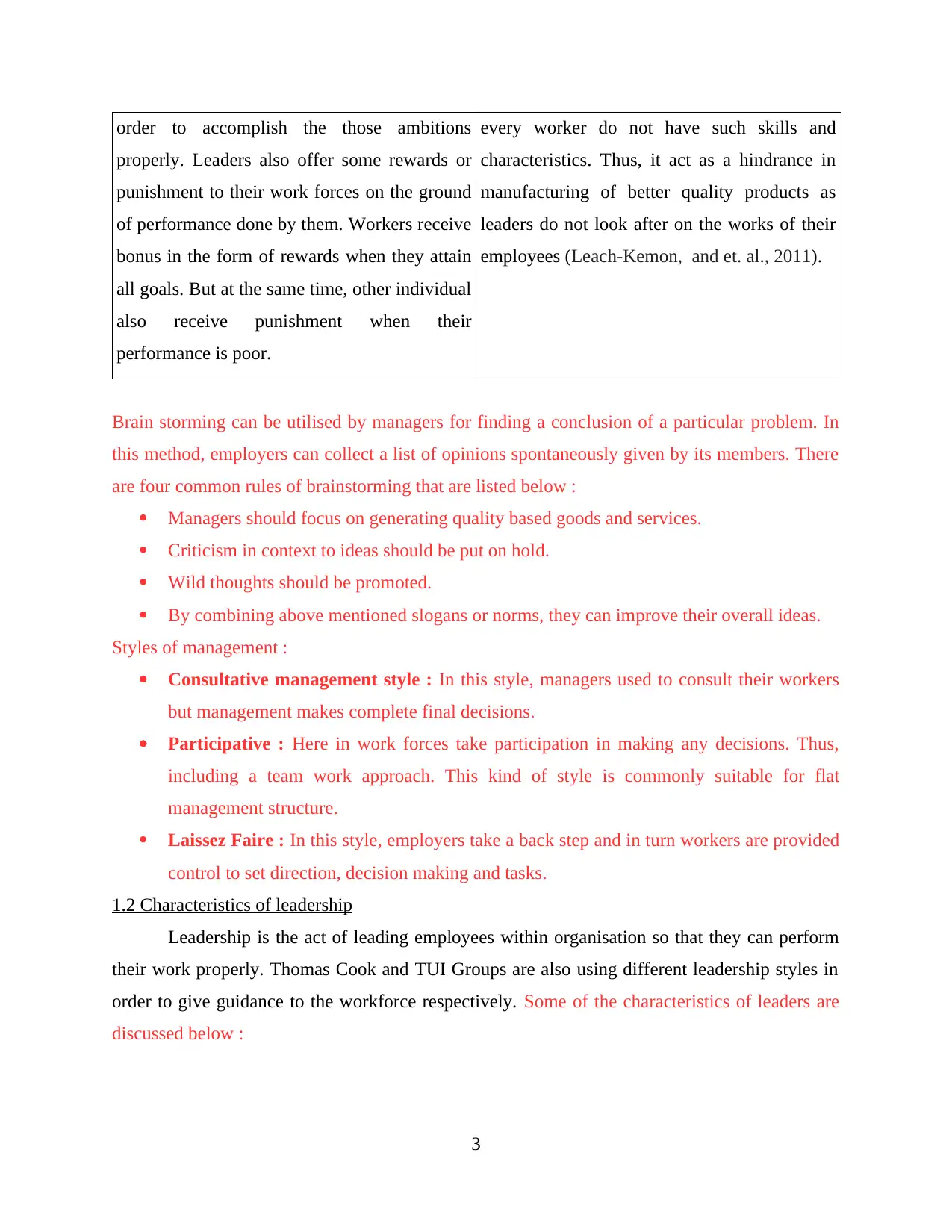
order to accomplish the those ambitions
properly. Leaders also offer some rewards or
punishment to their work forces on the ground
of performance done by them. Workers receive
bonus in the form of rewards when they attain
all goals. But at the same time, other individual
also receive punishment when their
performance is poor.
every worker do not have such skills and
characteristics. Thus, it act as a hindrance in
manufacturing of better quality products as
leaders do not look after on the works of their
employees (Leach-Kemon, and et. al., 2011).
Brain storming can be utilised by managers for finding a conclusion of a particular problem. In
this method, employers can collect a list of opinions spontaneously given by its members. There
are four common rules of brainstorming that are listed below :
Managers should focus on generating quality based goods and services.
Criticism in context to ideas should be put on hold.
Wild thoughts should be promoted.
By combining above mentioned slogans or norms, they can improve their overall ideas.
Styles of management :
Consultative management style : In this style, managers used to consult their workers
but management makes complete final decisions.
Participative : Here in work forces take participation in making any decisions. Thus,
including a team work approach. This kind of style is commonly suitable for flat
management structure.
Laissez Faire : In this style, employers take a back step and in turn workers are provided
control to set direction, decision making and tasks.
1.2 Characteristics of leadership
Leadership is the act of leading employees within organisation so that they can perform
their work properly. Thomas Cook and TUI Groups are also using different leadership styles in
order to give guidance to the workforce respectively. Some of the characteristics of leaders are
discussed below :
3
properly. Leaders also offer some rewards or
punishment to their work forces on the ground
of performance done by them. Workers receive
bonus in the form of rewards when they attain
all goals. But at the same time, other individual
also receive punishment when their
performance is poor.
every worker do not have such skills and
characteristics. Thus, it act as a hindrance in
manufacturing of better quality products as
leaders do not look after on the works of their
employees (Leach-Kemon, and et. al., 2011).
Brain storming can be utilised by managers for finding a conclusion of a particular problem. In
this method, employers can collect a list of opinions spontaneously given by its members. There
are four common rules of brainstorming that are listed below :
Managers should focus on generating quality based goods and services.
Criticism in context to ideas should be put on hold.
Wild thoughts should be promoted.
By combining above mentioned slogans or norms, they can improve their overall ideas.
Styles of management :
Consultative management style : In this style, managers used to consult their workers
but management makes complete final decisions.
Participative : Here in work forces take participation in making any decisions. Thus,
including a team work approach. This kind of style is commonly suitable for flat
management structure.
Laissez Faire : In this style, employers take a back step and in turn workers are provided
control to set direction, decision making and tasks.
1.2 Characteristics of leadership
Leadership is the act of leading employees within organisation so that they can perform
their work properly. Thomas Cook and TUI Groups are also using different leadership styles in
order to give guidance to the workforce respectively. Some of the characteristics of leaders are
discussed below :
3
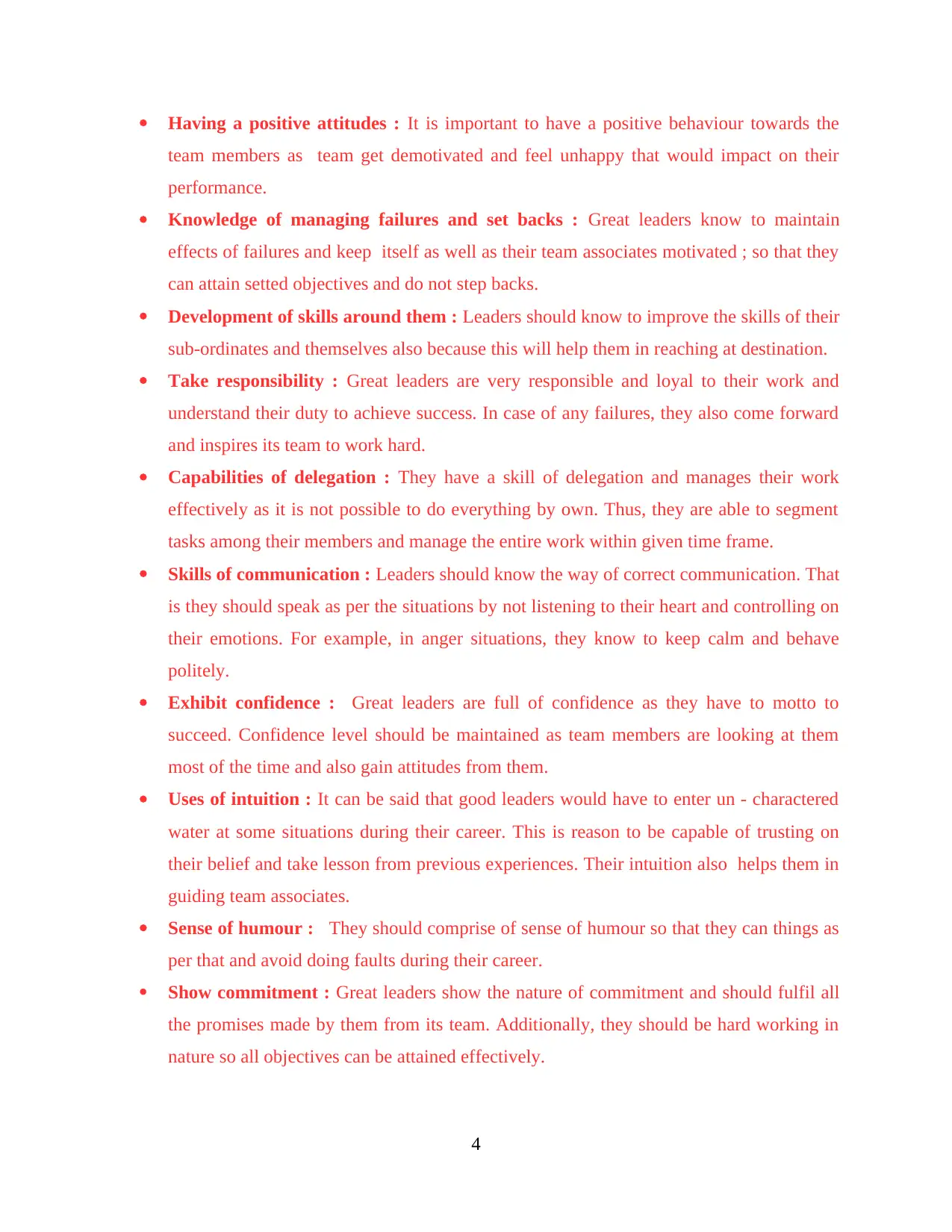
Having a positive attitudes : It is important to have a positive behaviour towards the
team members as team get demotivated and feel unhappy that would impact on their
performance.
Knowledge of managing failures and set backs : Great leaders know to maintain
effects of failures and keep itself as well as their team associates motivated ; so that they
can attain setted objectives and do not step backs.
Development of skills around them : Leaders should know to improve the skills of their
sub-ordinates and themselves also because this will help them in reaching at destination.
Take responsibility : Great leaders are very responsible and loyal to their work and
understand their duty to achieve success. In case of any failures, they also come forward
and inspires its team to work hard.
Capabilities of delegation : They have a skill of delegation and manages their work
effectively as it is not possible to do everything by own. Thus, they are able to segment
tasks among their members and manage the entire work within given time frame.
Skills of communication : Leaders should know the way of correct communication. That
is they should speak as per the situations by not listening to their heart and controlling on
their emotions. For example, in anger situations, they know to keep calm and behave
politely.
Exhibit confidence : Great leaders are full of confidence as they have to motto to
succeed. Confidence level should be maintained as team members are looking at them
most of the time and also gain attitudes from them.
Uses of intuition : It can be said that good leaders would have to enter un - charactered
water at some situations during their career. This is reason to be capable of trusting on
their belief and take lesson from previous experiences. Their intuition also helps them in
guiding team associates.
Sense of humour : They should comprise of sense of humour so that they can things as
per that and avoid doing faults during their career.
Show commitment : Great leaders show the nature of commitment and should fulfil all
the promises made by them from its team. Additionally, they should be hard working in
nature so all objectives can be attained effectively.
4
team members as team get demotivated and feel unhappy that would impact on their
performance.
Knowledge of managing failures and set backs : Great leaders know to maintain
effects of failures and keep itself as well as their team associates motivated ; so that they
can attain setted objectives and do not step backs.
Development of skills around them : Leaders should know to improve the skills of their
sub-ordinates and themselves also because this will help them in reaching at destination.
Take responsibility : Great leaders are very responsible and loyal to their work and
understand their duty to achieve success. In case of any failures, they also come forward
and inspires its team to work hard.
Capabilities of delegation : They have a skill of delegation and manages their work
effectively as it is not possible to do everything by own. Thus, they are able to segment
tasks among their members and manage the entire work within given time frame.
Skills of communication : Leaders should know the way of correct communication. That
is they should speak as per the situations by not listening to their heart and controlling on
their emotions. For example, in anger situations, they know to keep calm and behave
politely.
Exhibit confidence : Great leaders are full of confidence as they have to motto to
succeed. Confidence level should be maintained as team members are looking at them
most of the time and also gain attitudes from them.
Uses of intuition : It can be said that good leaders would have to enter un - charactered
water at some situations during their career. This is reason to be capable of trusting on
their belief and take lesson from previous experiences. Their intuition also helps them in
guiding team associates.
Sense of humour : They should comprise of sense of humour so that they can things as
per that and avoid doing faults during their career.
Show commitment : Great leaders show the nature of commitment and should fulfil all
the promises made by them from its team. Additionally, they should be hard working in
nature so all objectives can be attained effectively.
4
Paraphrase This Document
Need a fresh take? Get an instant paraphrase of this document with our AI Paraphraser
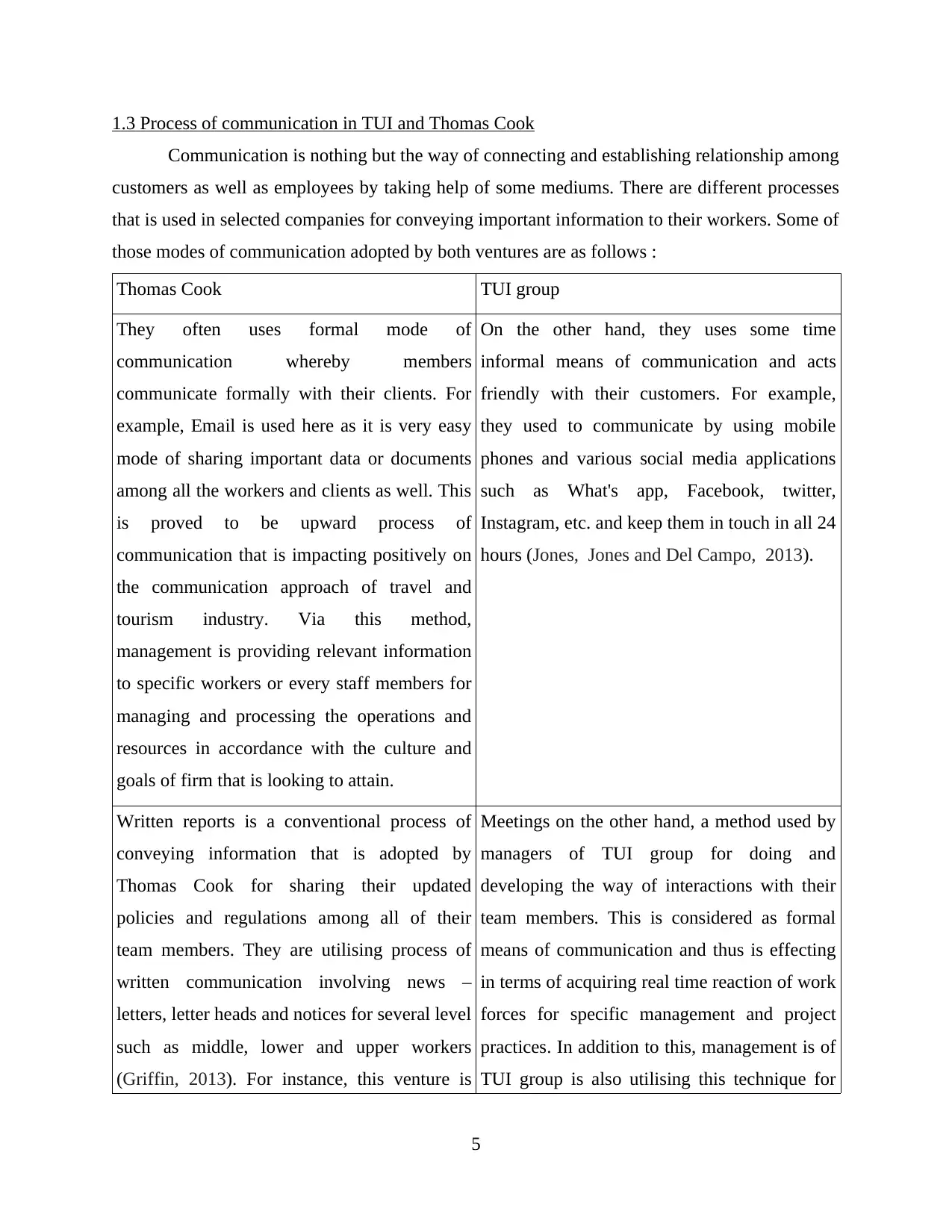
1.3 Process of communication in TUI and Thomas Cook
Communication is nothing but the way of connecting and establishing relationship among
customers as well as employees by taking help of some mediums. There are different processes
that is used in selected companies for conveying important information to their workers. Some of
those modes of communication adopted by both ventures are as follows :
Thomas Cook TUI group
They often uses formal mode of
communication whereby members
communicate formally with their clients. For
example, Email is used here as it is very easy
mode of sharing important data or documents
among all the workers and clients as well. This
is proved to be upward process of
communication that is impacting positively on
the communication approach of travel and
tourism industry. Via this method,
management is providing relevant information
to specific workers or every staff members for
managing and processing the operations and
resources in accordance with the culture and
goals of firm that is looking to attain.
On the other hand, they uses some time
informal means of communication and acts
friendly with their customers. For example,
they used to communicate by using mobile
phones and various social media applications
such as What's app, Facebook, twitter,
Instagram, etc. and keep them in touch in all 24
hours (Jones, Jones and Del Campo, 2013).
Written reports is a conventional process of
conveying information that is adopted by
Thomas Cook for sharing their updated
policies and regulations among all of their
team members. They are utilising process of
written communication involving news –
letters, letter heads and notices for several level
such as middle, lower and upper workers
(Griffin, 2013). For instance, this venture is
Meetings on the other hand, a method used by
managers of TUI group for doing and
developing the way of interactions with their
team members. This is considered as formal
means of communication and thus is effecting
in terms of acquiring real time reaction of work
forces for specific management and project
practices. In addition to this, management is of
TUI group is also utilising this technique for
5
Communication is nothing but the way of connecting and establishing relationship among
customers as well as employees by taking help of some mediums. There are different processes
that is used in selected companies for conveying important information to their workers. Some of
those modes of communication adopted by both ventures are as follows :
Thomas Cook TUI group
They often uses formal mode of
communication whereby members
communicate formally with their clients. For
example, Email is used here as it is very easy
mode of sharing important data or documents
among all the workers and clients as well. This
is proved to be upward process of
communication that is impacting positively on
the communication approach of travel and
tourism industry. Via this method,
management is providing relevant information
to specific workers or every staff members for
managing and processing the operations and
resources in accordance with the culture and
goals of firm that is looking to attain.
On the other hand, they uses some time
informal means of communication and acts
friendly with their customers. For example,
they used to communicate by using mobile
phones and various social media applications
such as What's app, Facebook, twitter,
Instagram, etc. and keep them in touch in all 24
hours (Jones, Jones and Del Campo, 2013).
Written reports is a conventional process of
conveying information that is adopted by
Thomas Cook for sharing their updated
policies and regulations among all of their
team members. They are utilising process of
written communication involving news –
letters, letter heads and notices for several level
such as middle, lower and upper workers
(Griffin, 2013). For instance, this venture is
Meetings on the other hand, a method used by
managers of TUI group for doing and
developing the way of interactions with their
team members. This is considered as formal
means of communication and thus is effecting
in terms of acquiring real time reaction of work
forces for specific management and project
practices. In addition to this, management is of
TUI group is also utilising this technique for
5
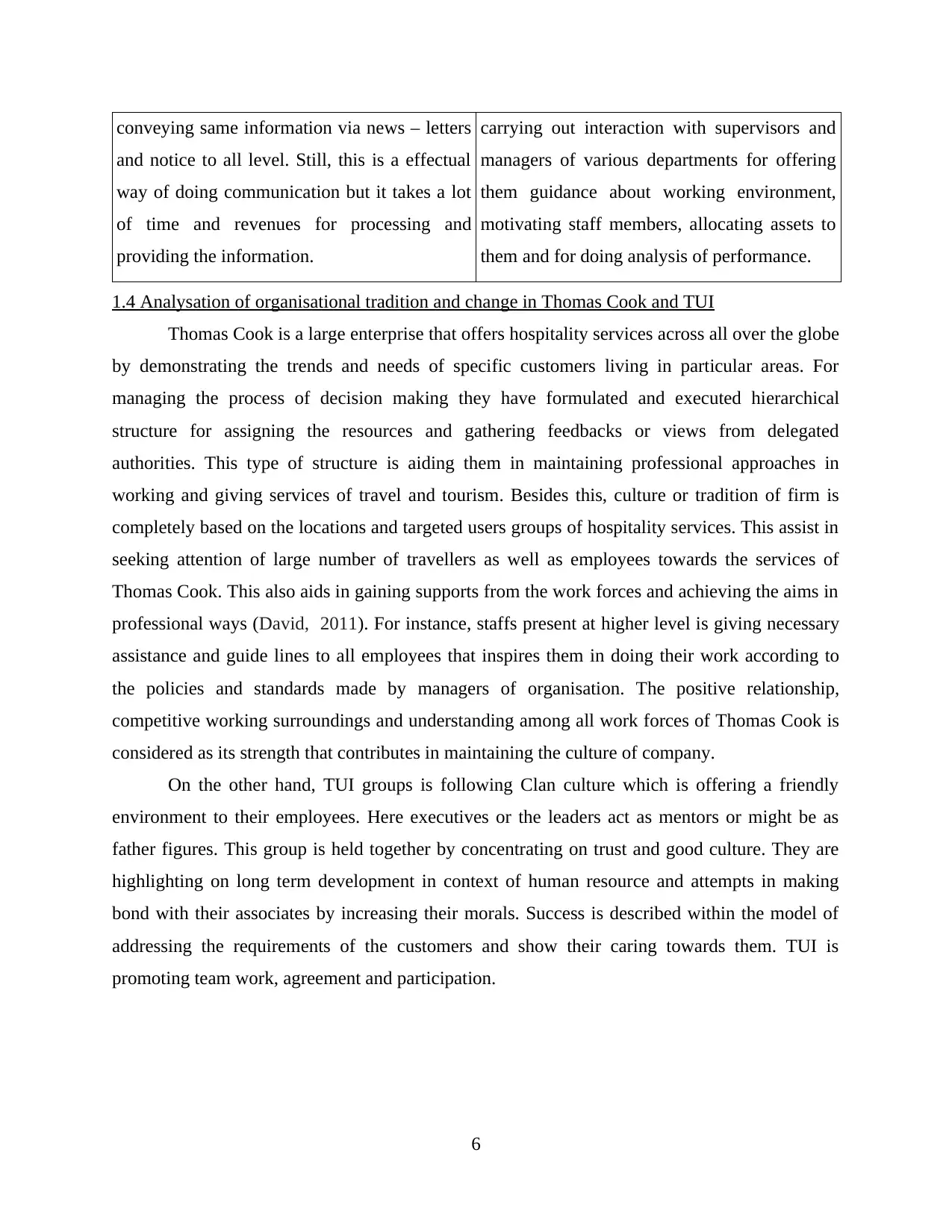
conveying same information via news – letters
and notice to all level. Still, this is a effectual
way of doing communication but it takes a lot
of time and revenues for processing and
providing the information.
carrying out interaction with supervisors and
managers of various departments for offering
them guidance about working environment,
motivating staff members, allocating assets to
them and for doing analysis of performance.
1.4 Analysation of organisational tradition and change in Thomas Cook and TUI
Thomas Cook is a large enterprise that offers hospitality services across all over the globe
by demonstrating the trends and needs of specific customers living in particular areas. For
managing the process of decision making they have formulated and executed hierarchical
structure for assigning the resources and gathering feedbacks or views from delegated
authorities. This type of structure is aiding them in maintaining professional approaches in
working and giving services of travel and tourism. Besides this, culture or tradition of firm is
completely based on the locations and targeted users groups of hospitality services. This assist in
seeking attention of large number of travellers as well as employees towards the services of
Thomas Cook. This also aids in gaining supports from the work forces and achieving the aims in
professional ways (David, 2011). For instance, staffs present at higher level is giving necessary
assistance and guide lines to all employees that inspires them in doing their work according to
the policies and standards made by managers of organisation. The positive relationship,
competitive working surroundings and understanding among all work forces of Thomas Cook is
considered as its strength that contributes in maintaining the culture of company.
On the other hand, TUI groups is following Clan culture which is offering a friendly
environment to their employees. Here executives or the leaders act as mentors or might be as
father figures. This group is held together by concentrating on trust and good culture. They are
highlighting on long term development in context of human resource and attempts in making
bond with their associates by increasing their morals. Success is described within the model of
addressing the requirements of the customers and show their caring towards them. TUI is
promoting team work, agreement and participation.
6
and notice to all level. Still, this is a effectual
way of doing communication but it takes a lot
of time and revenues for processing and
providing the information.
carrying out interaction with supervisors and
managers of various departments for offering
them guidance about working environment,
motivating staff members, allocating assets to
them and for doing analysis of performance.
1.4 Analysation of organisational tradition and change in Thomas Cook and TUI
Thomas Cook is a large enterprise that offers hospitality services across all over the globe
by demonstrating the trends and needs of specific customers living in particular areas. For
managing the process of decision making they have formulated and executed hierarchical
structure for assigning the resources and gathering feedbacks or views from delegated
authorities. This type of structure is aiding them in maintaining professional approaches in
working and giving services of travel and tourism. Besides this, culture or tradition of firm is
completely based on the locations and targeted users groups of hospitality services. This assist in
seeking attention of large number of travellers as well as employees towards the services of
Thomas Cook. This also aids in gaining supports from the work forces and achieving the aims in
professional ways (David, 2011). For instance, staffs present at higher level is giving necessary
assistance and guide lines to all employees that inspires them in doing their work according to
the policies and standards made by managers of organisation. The positive relationship,
competitive working surroundings and understanding among all work forces of Thomas Cook is
considered as its strength that contributes in maintaining the culture of company.
On the other hand, TUI groups is following Clan culture which is offering a friendly
environment to their employees. Here executives or the leaders act as mentors or might be as
father figures. This group is held together by concentrating on trust and good culture. They are
highlighting on long term development in context of human resource and attempts in making
bond with their associates by increasing their morals. Success is described within the model of
addressing the requirements of the customers and show their caring towards them. TUI is
promoting team work, agreement and participation.
6
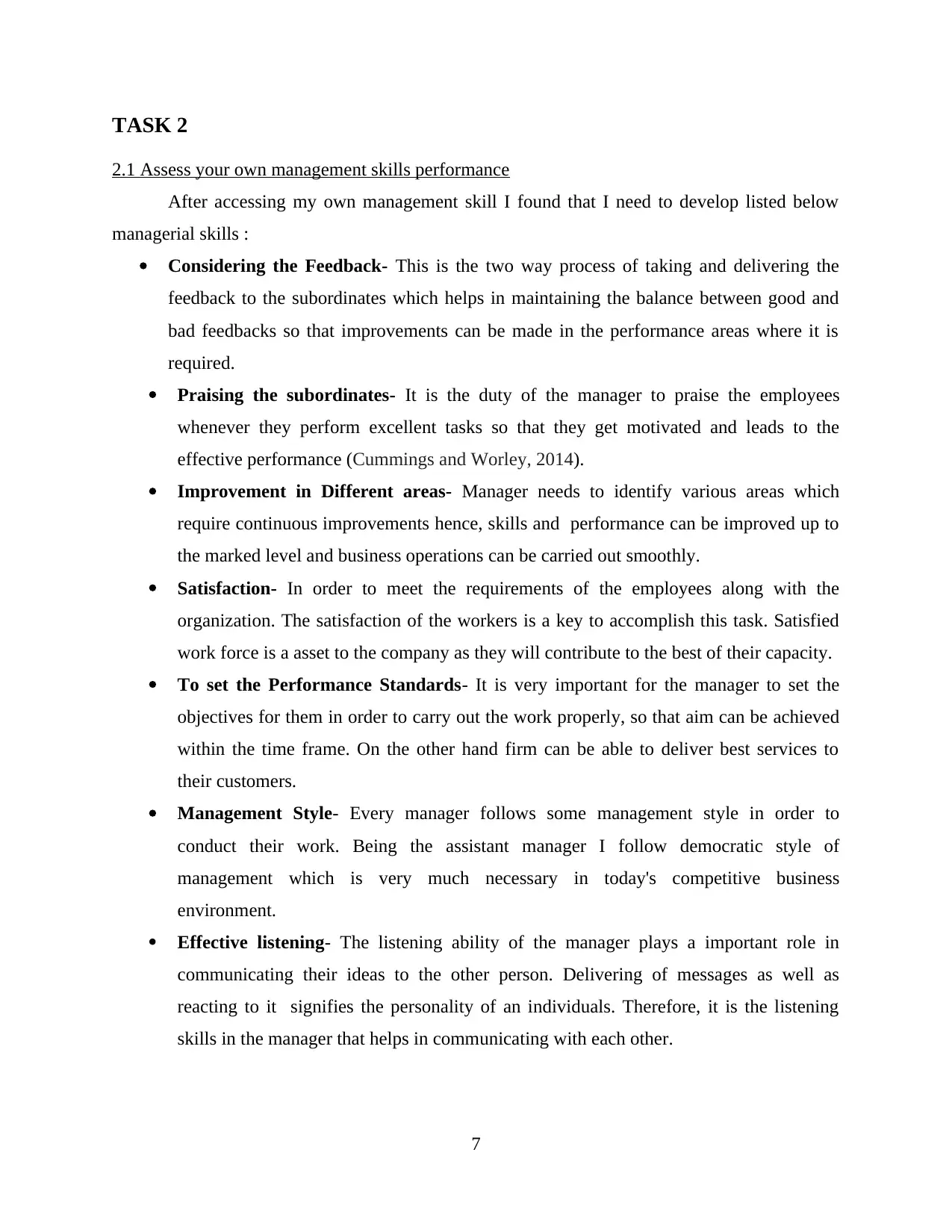
TASK 2
2.1 Assess your own management skills performance
After accessing my own management skill I found that I need to develop listed below
managerial skills :
Considering the Feedback- This is the two way process of taking and delivering the
feedback to the subordinates which helps in maintaining the balance between good and
bad feedbacks so that improvements can be made in the performance areas where it is
required.
Praising the subordinates- It is the duty of the manager to praise the employees
whenever they perform excellent tasks so that they get motivated and leads to the
effective performance (Cummings and Worley, 2014).
Improvement in Different areas- Manager needs to identify various areas which
require continuous improvements hence, skills and performance can be improved up to
the marked level and business operations can be carried out smoothly.
Satisfaction- In order to meet the requirements of the employees along with the
organization. The satisfaction of the workers is a key to accomplish this task. Satisfied
work force is a asset to the company as they will contribute to the best of their capacity.
To set the Performance Standards- It is very important for the manager to set the
objectives for them in order to carry out the work properly, so that aim can be achieved
within the time frame. On the other hand firm can be able to deliver best services to
their customers.
Management Style- Every manager follows some management style in order to
conduct their work. Being the assistant manager I follow democratic style of
management which is very much necessary in today's competitive business
environment.
Effective listening- The listening ability of the manager plays a important role in
communicating their ideas to the other person. Delivering of messages as well as
reacting to it signifies the personality of an individuals. Therefore, it is the listening
skills in the manager that helps in communicating with each other.
7
2.1 Assess your own management skills performance
After accessing my own management skill I found that I need to develop listed below
managerial skills :
Considering the Feedback- This is the two way process of taking and delivering the
feedback to the subordinates which helps in maintaining the balance between good and
bad feedbacks so that improvements can be made in the performance areas where it is
required.
Praising the subordinates- It is the duty of the manager to praise the employees
whenever they perform excellent tasks so that they get motivated and leads to the
effective performance (Cummings and Worley, 2014).
Improvement in Different areas- Manager needs to identify various areas which
require continuous improvements hence, skills and performance can be improved up to
the marked level and business operations can be carried out smoothly.
Satisfaction- In order to meet the requirements of the employees along with the
organization. The satisfaction of the workers is a key to accomplish this task. Satisfied
work force is a asset to the company as they will contribute to the best of their capacity.
To set the Performance Standards- It is very important for the manager to set the
objectives for them in order to carry out the work properly, so that aim can be achieved
within the time frame. On the other hand firm can be able to deliver best services to
their customers.
Management Style- Every manager follows some management style in order to
conduct their work. Being the assistant manager I follow democratic style of
management which is very much necessary in today's competitive business
environment.
Effective listening- The listening ability of the manager plays a important role in
communicating their ideas to the other person. Delivering of messages as well as
reacting to it signifies the personality of an individuals. Therefore, it is the listening
skills in the manager that helps in communicating with each other.
7
Secure Best Marks with AI Grader
Need help grading? Try our AI Grader for instant feedback on your assignments.
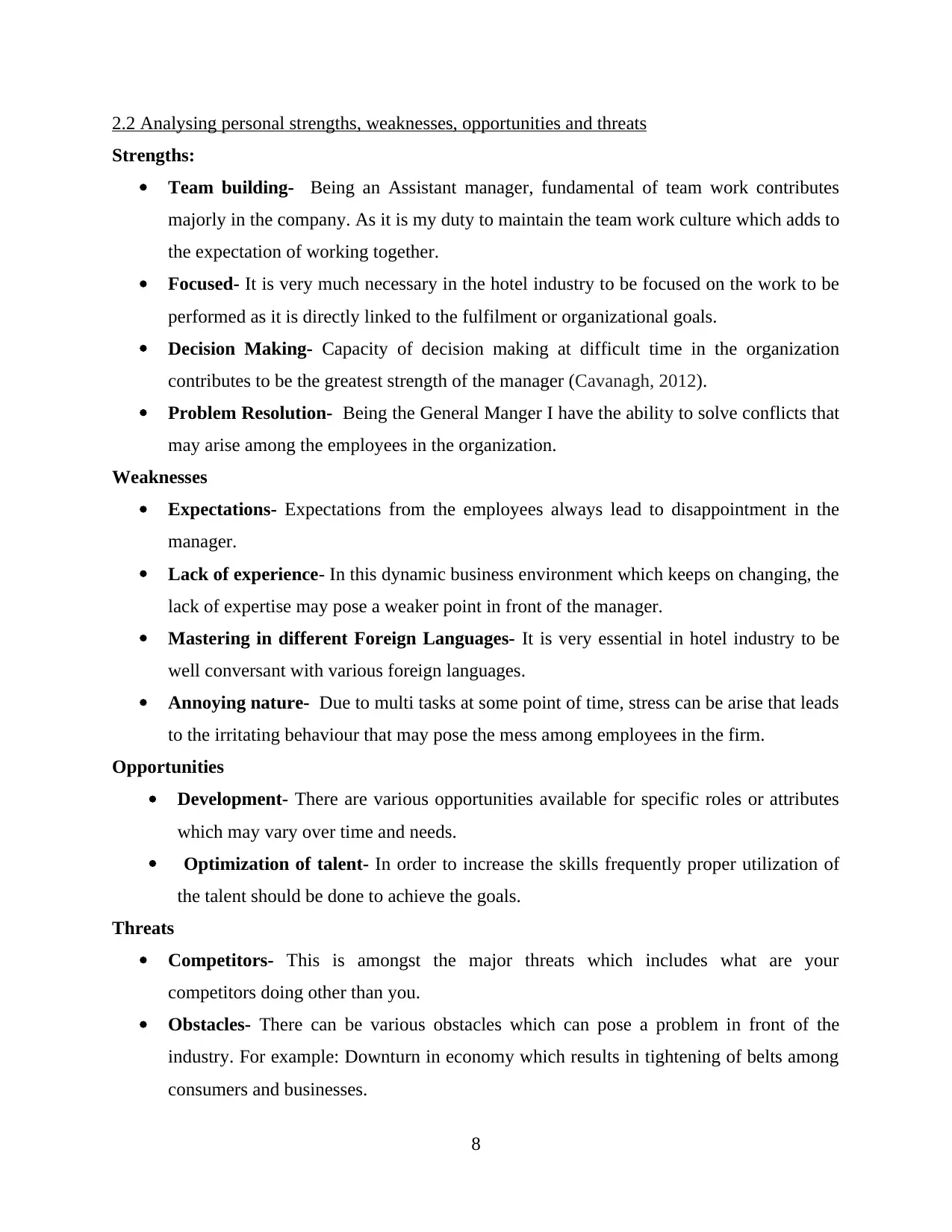
2.2 Analysing personal strengths, weaknesses, opportunities and threats
Strengths:
Team building- Being an Assistant manager, fundamental of team work contributes
majorly in the company. As it is my duty to maintain the team work culture which adds to
the expectation of working together.
Focused- It is very much necessary in the hotel industry to be focused on the work to be
performed as it is directly linked to the fulfilment or organizational goals.
Decision Making- Capacity of decision making at difficult time in the organization
contributes to be the greatest strength of the manager (Cavanagh, 2012).
Problem Resolution- Being the General Manger I have the ability to solve conflicts that
may arise among the employees in the organization.
Weaknesses
Expectations- Expectations from the employees always lead to disappointment in the
manager.
Lack of experience- In this dynamic business environment which keeps on changing, the
lack of expertise may pose a weaker point in front of the manager.
Mastering in different Foreign Languages- It is very essential in hotel industry to be
well conversant with various foreign languages.
Annoying nature- Due to multi tasks at some point of time, stress can be arise that leads
to the irritating behaviour that may pose the mess among employees in the firm.
Opportunities
Development- There are various opportunities available for specific roles or attributes
which may vary over time and needs.
Optimization of talent- In order to increase the skills frequently proper utilization of
the talent should be done to achieve the goals.
Threats
Competitors- This is amongst the major threats which includes what are your
competitors doing other than you.
Obstacles- There can be various obstacles which can pose a problem in front of the
industry. For example: Downturn in economy which results in tightening of belts among
consumers and businesses.
8
Strengths:
Team building- Being an Assistant manager, fundamental of team work contributes
majorly in the company. As it is my duty to maintain the team work culture which adds to
the expectation of working together.
Focused- It is very much necessary in the hotel industry to be focused on the work to be
performed as it is directly linked to the fulfilment or organizational goals.
Decision Making- Capacity of decision making at difficult time in the organization
contributes to be the greatest strength of the manager (Cavanagh, 2012).
Problem Resolution- Being the General Manger I have the ability to solve conflicts that
may arise among the employees in the organization.
Weaknesses
Expectations- Expectations from the employees always lead to disappointment in the
manager.
Lack of experience- In this dynamic business environment which keeps on changing, the
lack of expertise may pose a weaker point in front of the manager.
Mastering in different Foreign Languages- It is very essential in hotel industry to be
well conversant with various foreign languages.
Annoying nature- Due to multi tasks at some point of time, stress can be arise that leads
to the irritating behaviour that may pose the mess among employees in the firm.
Opportunities
Development- There are various opportunities available for specific roles or attributes
which may vary over time and needs.
Optimization of talent- In order to increase the skills frequently proper utilization of
the talent should be done to achieve the goals.
Threats
Competitors- This is amongst the major threats which includes what are your
competitors doing other than you.
Obstacles- There can be various obstacles which can pose a problem in front of the
industry. For example: Downturn in economy which results in tightening of belts among
consumers and businesses.
8
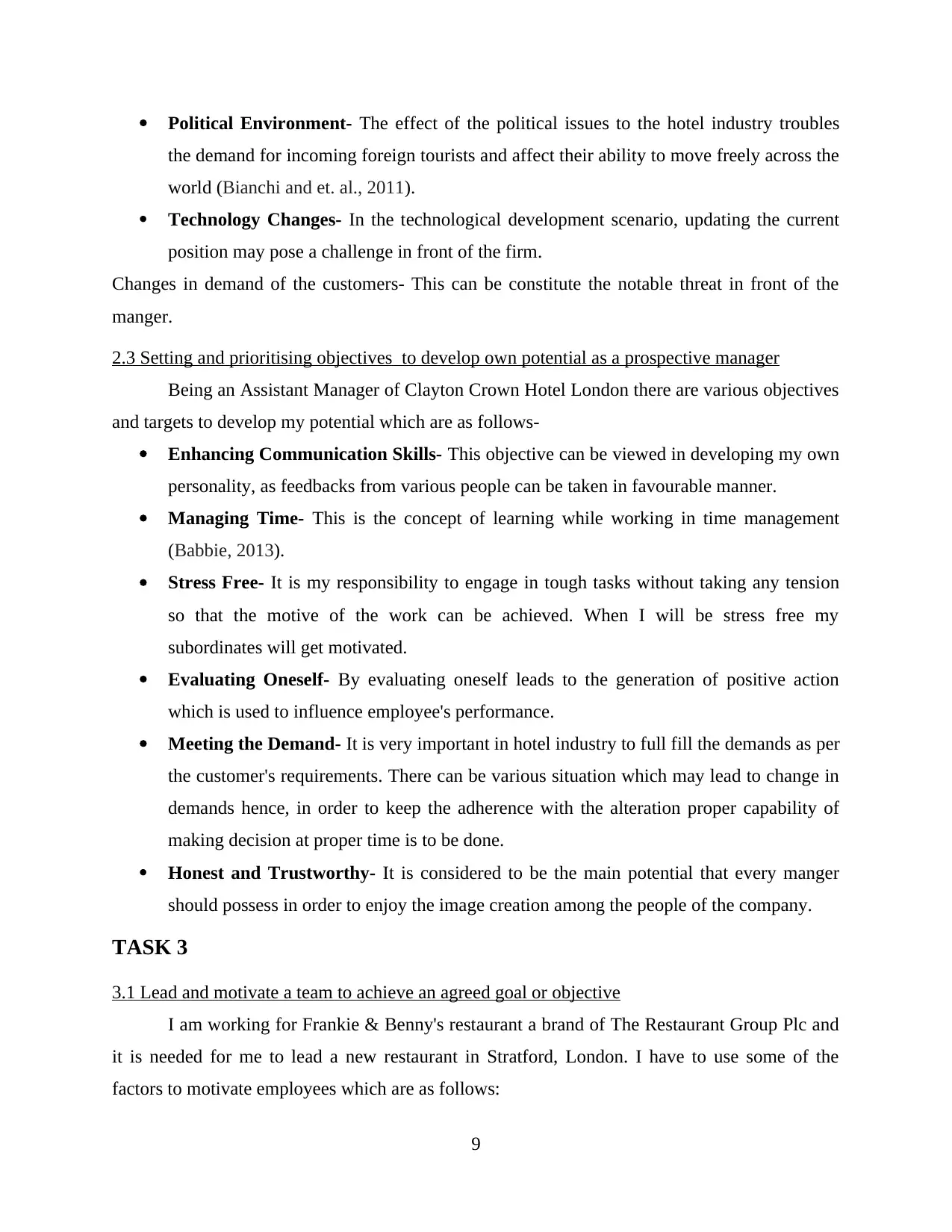
Political Environment- The effect of the political issues to the hotel industry troubles
the demand for incoming foreign tourists and affect their ability to move freely across the
world (Bianchi and et. al., 2011).
Technology Changes- In the technological development scenario, updating the current
position may pose a challenge in front of the firm.
Changes in demand of the customers- This can be constitute the notable threat in front of the
manger.
2.3 Setting and prioritising objectives to develop own potential as a prospective manager
Being an Assistant Manager of Clayton Crown Hotel London there are various objectives
and targets to develop my potential which are as follows-
Enhancing Communication Skills- This objective can be viewed in developing my own
personality, as feedbacks from various people can be taken in favourable manner.
Managing Time- This is the concept of learning while working in time management
(Babbie, 2013).
Stress Free- It is my responsibility to engage in tough tasks without taking any tension
so that the motive of the work can be achieved. When I will be stress free my
subordinates will get motivated.
Evaluating Oneself- By evaluating oneself leads to the generation of positive action
which is used to influence employee's performance.
Meeting the Demand- It is very important in hotel industry to full fill the demands as per
the customer's requirements. There can be various situation which may lead to change in
demands hence, in order to keep the adherence with the alteration proper capability of
making decision at proper time is to be done.
Honest and Trustworthy- It is considered to be the main potential that every manger
should possess in order to enjoy the image creation among the people of the company.
TASK 3
3.1 Lead and motivate a team to achieve an agreed goal or objective
I am working for Frankie & Benny's restaurant a brand of The Restaurant Group Plc and
it is needed for me to lead a new restaurant in Stratford, London. I have to use some of the
factors to motivate employees which are as follows:
9
the demand for incoming foreign tourists and affect their ability to move freely across the
world (Bianchi and et. al., 2011).
Technology Changes- In the technological development scenario, updating the current
position may pose a challenge in front of the firm.
Changes in demand of the customers- This can be constitute the notable threat in front of the
manger.
2.3 Setting and prioritising objectives to develop own potential as a prospective manager
Being an Assistant Manager of Clayton Crown Hotel London there are various objectives
and targets to develop my potential which are as follows-
Enhancing Communication Skills- This objective can be viewed in developing my own
personality, as feedbacks from various people can be taken in favourable manner.
Managing Time- This is the concept of learning while working in time management
(Babbie, 2013).
Stress Free- It is my responsibility to engage in tough tasks without taking any tension
so that the motive of the work can be achieved. When I will be stress free my
subordinates will get motivated.
Evaluating Oneself- By evaluating oneself leads to the generation of positive action
which is used to influence employee's performance.
Meeting the Demand- It is very important in hotel industry to full fill the demands as per
the customer's requirements. There can be various situation which may lead to change in
demands hence, in order to keep the adherence with the alteration proper capability of
making decision at proper time is to be done.
Honest and Trustworthy- It is considered to be the main potential that every manger
should possess in order to enjoy the image creation among the people of the company.
TASK 3
3.1 Lead and motivate a team to achieve an agreed goal or objective
I am working for Frankie & Benny's restaurant a brand of The Restaurant Group Plc and
it is needed for me to lead a new restaurant in Stratford, London. I have to use some of the
factors to motivate employees which are as follows:
9
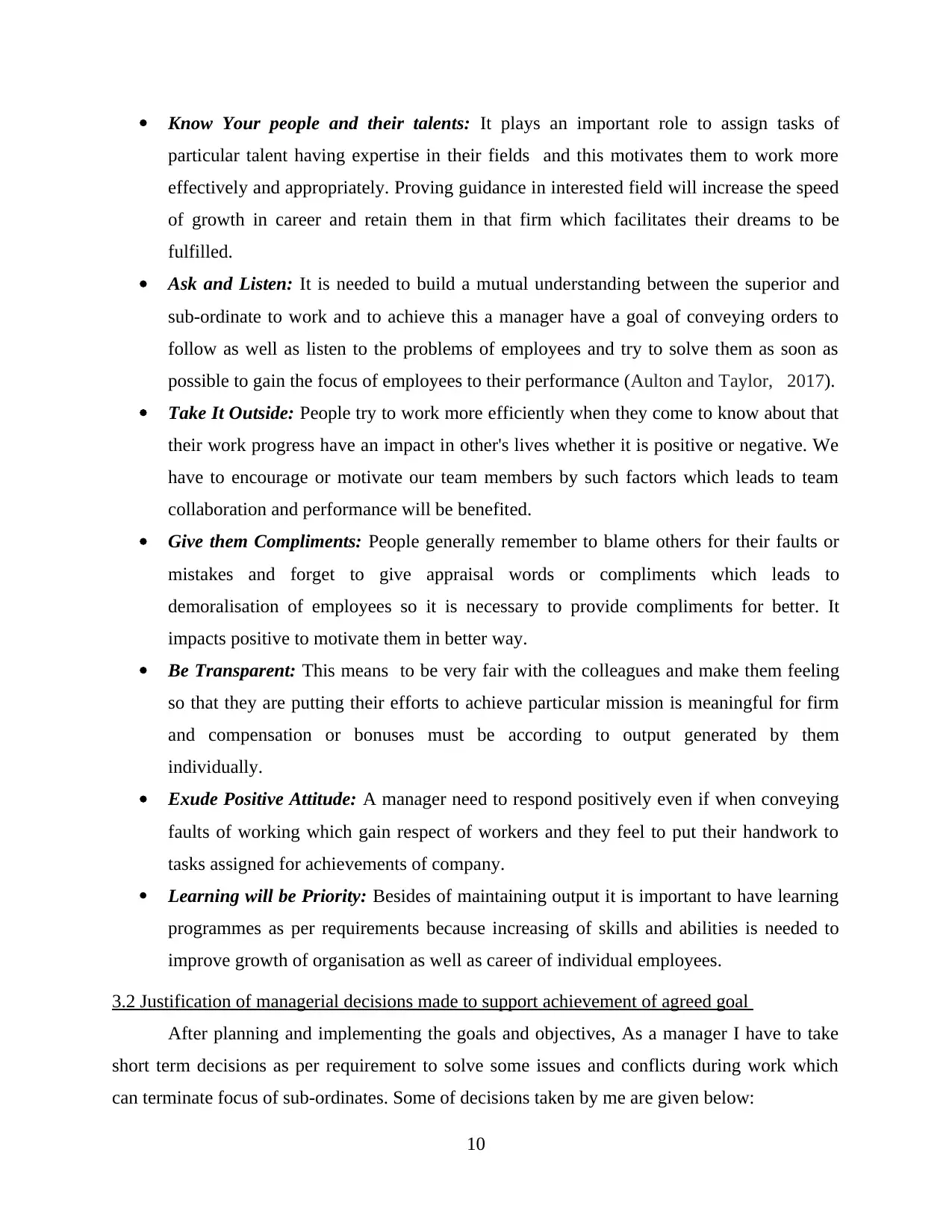
Know Your people and their talents: It plays an important role to assign tasks of
particular talent having expertise in their fields and this motivates them to work more
effectively and appropriately. Proving guidance in interested field will increase the speed
of growth in career and retain them in that firm which facilitates their dreams to be
fulfilled.
Ask and Listen: It is needed to build a mutual understanding between the superior and
sub-ordinate to work and to achieve this a manager have a goal of conveying orders to
follow as well as listen to the problems of employees and try to solve them as soon as
possible to gain the focus of employees to their performance (Aulton and Taylor, 2017).
Take It Outside: People try to work more efficiently when they come to know about that
their work progress have an impact in other's lives whether it is positive or negative. We
have to encourage or motivate our team members by such factors which leads to team
collaboration and performance will be benefited.
Give them Compliments: People generally remember to blame others for their faults or
mistakes and forget to give appraisal words or compliments which leads to
demoralisation of employees so it is necessary to provide compliments for better. It
impacts positive to motivate them in better way.
Be Transparent: This means to be very fair with the colleagues and make them feeling
so that they are putting their efforts to achieve particular mission is meaningful for firm
and compensation or bonuses must be according to output generated by them
individually.
Exude Positive Attitude: A manager need to respond positively even if when conveying
faults of working which gain respect of workers and they feel to put their handwork to
tasks assigned for achievements of company.
Learning will be Priority: Besides of maintaining output it is important to have learning
programmes as per requirements because increasing of skills and abilities is needed to
improve growth of organisation as well as career of individual employees.
3.2 Justification of managerial decisions made to support achievement of agreed goal
After planning and implementing the goals and objectives, As a manager I have to take
short term decisions as per requirement to solve some issues and conflicts during work which
can terminate focus of sub-ordinates. Some of decisions taken by me are given below:
10
particular talent having expertise in their fields and this motivates them to work more
effectively and appropriately. Proving guidance in interested field will increase the speed
of growth in career and retain them in that firm which facilitates their dreams to be
fulfilled.
Ask and Listen: It is needed to build a mutual understanding between the superior and
sub-ordinate to work and to achieve this a manager have a goal of conveying orders to
follow as well as listen to the problems of employees and try to solve them as soon as
possible to gain the focus of employees to their performance (Aulton and Taylor, 2017).
Take It Outside: People try to work more efficiently when they come to know about that
their work progress have an impact in other's lives whether it is positive or negative. We
have to encourage or motivate our team members by such factors which leads to team
collaboration and performance will be benefited.
Give them Compliments: People generally remember to blame others for their faults or
mistakes and forget to give appraisal words or compliments which leads to
demoralisation of employees so it is necessary to provide compliments for better. It
impacts positive to motivate them in better way.
Be Transparent: This means to be very fair with the colleagues and make them feeling
so that they are putting their efforts to achieve particular mission is meaningful for firm
and compensation or bonuses must be according to output generated by them
individually.
Exude Positive Attitude: A manager need to respond positively even if when conveying
faults of working which gain respect of workers and they feel to put their handwork to
tasks assigned for achievements of company.
Learning will be Priority: Besides of maintaining output it is important to have learning
programmes as per requirements because increasing of skills and abilities is needed to
improve growth of organisation as well as career of individual employees.
3.2 Justification of managerial decisions made to support achievement of agreed goal
After planning and implementing the goals and objectives, As a manager I have to take
short term decisions as per requirement to solve some issues and conflicts during work which
can terminate focus of sub-ordinates. Some of decisions taken by me are given below:
10
Paraphrase This Document
Need a fresh take? Get an instant paraphrase of this document with our AI Paraphraser
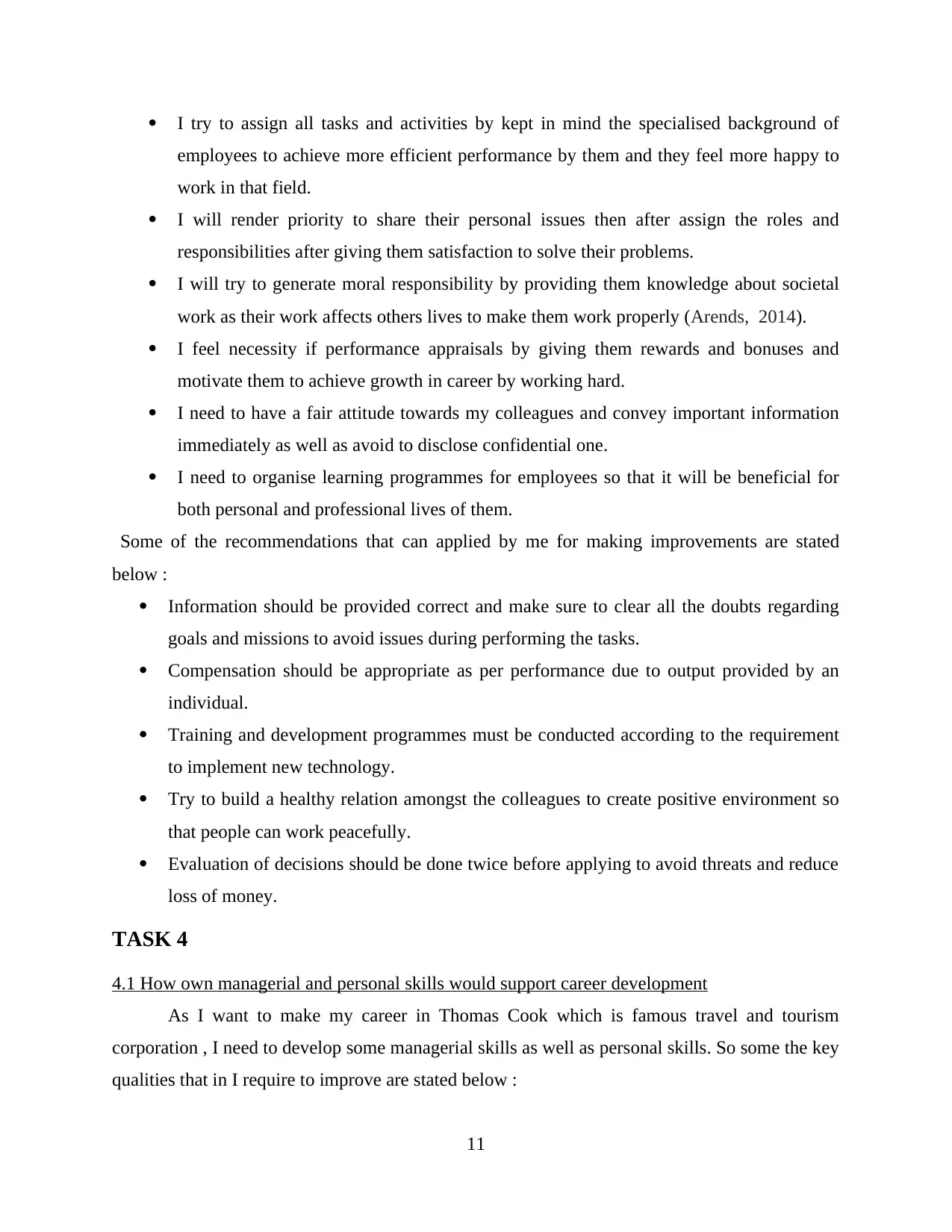
I try to assign all tasks and activities by kept in mind the specialised background of
employees to achieve more efficient performance by them and they feel more happy to
work in that field.
I will render priority to share their personal issues then after assign the roles and
responsibilities after giving them satisfaction to solve their problems.
I will try to generate moral responsibility by providing them knowledge about societal
work as their work affects others lives to make them work properly (Arends, 2014).
I feel necessity if performance appraisals by giving them rewards and bonuses and
motivate them to achieve growth in career by working hard.
I need to have a fair attitude towards my colleagues and convey important information
immediately as well as avoid to disclose confidential one.
I need to organise learning programmes for employees so that it will be beneficial for
both personal and professional lives of them.
Some of the recommendations that can applied by me for making improvements are stated
below :
Information should be provided correct and make sure to clear all the doubts regarding
goals and missions to avoid issues during performing the tasks.
Compensation should be appropriate as per performance due to output provided by an
individual.
Training and development programmes must be conducted according to the requirement
to implement new technology.
Try to build a healthy relation amongst the colleagues to create positive environment so
that people can work peacefully.
Evaluation of decisions should be done twice before applying to avoid threats and reduce
loss of money.
TASK 4
4.1 How own managerial and personal skills would support career development
As I want to make my career in Thomas Cook which is famous travel and tourism
corporation , I need to develop some managerial skills as well as personal skills. So some the key
qualities that in I require to improve are stated below :
11
employees to achieve more efficient performance by them and they feel more happy to
work in that field.
I will render priority to share their personal issues then after assign the roles and
responsibilities after giving them satisfaction to solve their problems.
I will try to generate moral responsibility by providing them knowledge about societal
work as their work affects others lives to make them work properly (Arends, 2014).
I feel necessity if performance appraisals by giving them rewards and bonuses and
motivate them to achieve growth in career by working hard.
I need to have a fair attitude towards my colleagues and convey important information
immediately as well as avoid to disclose confidential one.
I need to organise learning programmes for employees so that it will be beneficial for
both personal and professional lives of them.
Some of the recommendations that can applied by me for making improvements are stated
below :
Information should be provided correct and make sure to clear all the doubts regarding
goals and missions to avoid issues during performing the tasks.
Compensation should be appropriate as per performance due to output provided by an
individual.
Training and development programmes must be conducted according to the requirement
to implement new technology.
Try to build a healthy relation amongst the colleagues to create positive environment so
that people can work peacefully.
Evaluation of decisions should be done twice before applying to avoid threats and reduce
loss of money.
TASK 4
4.1 How own managerial and personal skills would support career development
As I want to make my career in Thomas Cook which is famous travel and tourism
corporation , I need to develop some managerial skills as well as personal skills. So some the key
qualities that in I require to improve are stated below :
11
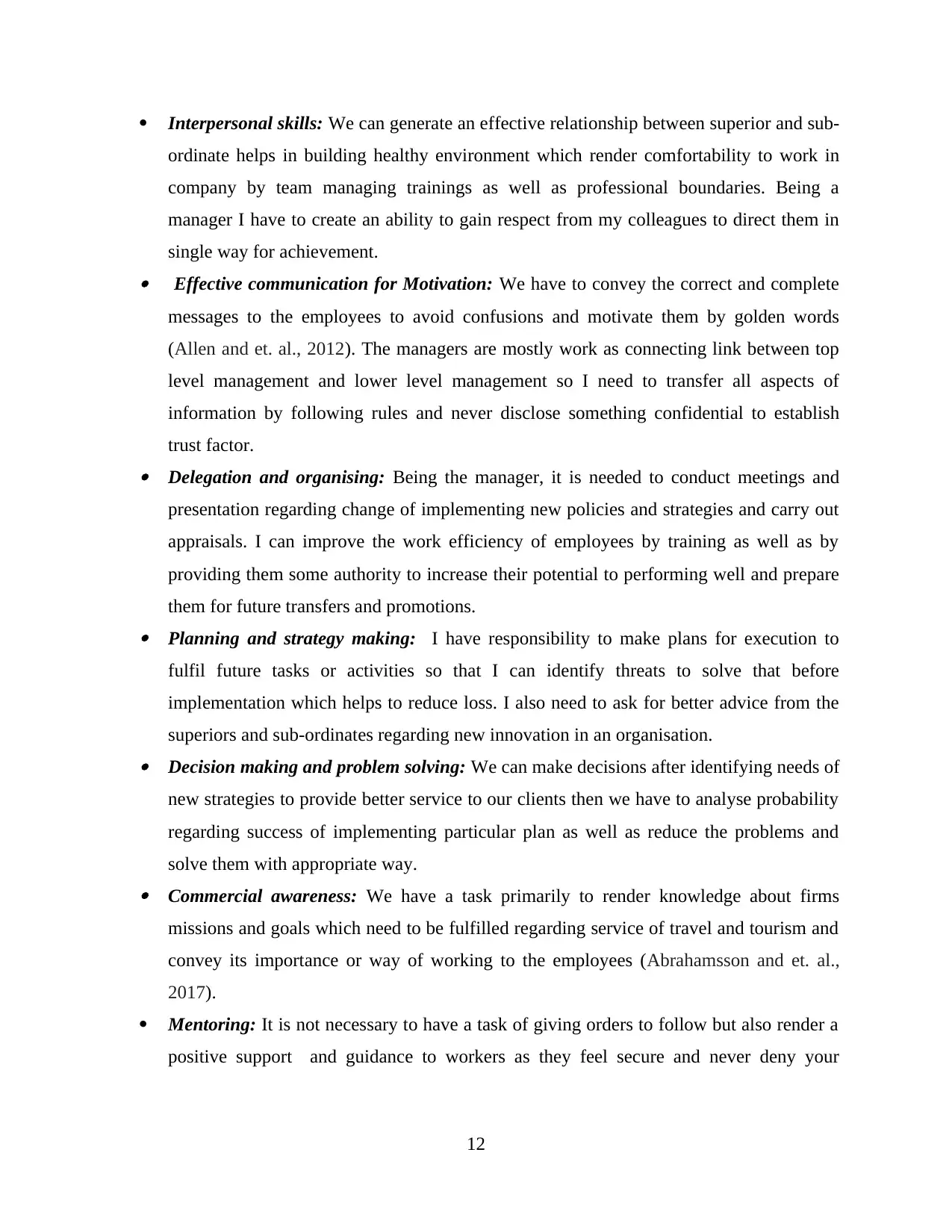
Interpersonal skills: We can generate an effective relationship between superior and sub-
ordinate helps in building healthy environment which render comfortability to work in
company by team managing trainings as well as professional boundaries. Being a
manager I have to create an ability to gain respect from my colleagues to direct them in
single way for achievement. Effective communication for Motivation: We have to convey the correct and complete
messages to the employees to avoid confusions and motivate them by golden words
(Allen and et. al., 2012). The managers are mostly work as connecting link between top
level management and lower level management so I need to transfer all aspects of
information by following rules and never disclose something confidential to establish
trust factor. Delegation and organising: Being the manager, it is needed to conduct meetings and
presentation regarding change of implementing new policies and strategies and carry out
appraisals. I can improve the work efficiency of employees by training as well as by
providing them some authority to increase their potential to performing well and prepare
them for future transfers and promotions. Planning and strategy making: I have responsibility to make plans for execution to
fulfil future tasks or activities so that I can identify threats to solve that before
implementation which helps to reduce loss. I also need to ask for better advice from the
superiors and sub-ordinates regarding new innovation in an organisation. Decision making and problem solving: We can make decisions after identifying needs of
new strategies to provide better service to our clients then we have to analyse probability
regarding success of implementing particular plan as well as reduce the problems and
solve them with appropriate way. Commercial awareness: We have a task primarily to render knowledge about firms
missions and goals which need to be fulfilled regarding service of travel and tourism and
convey its importance or way of working to the employees (Abrahamsson and et. al.,
2017).
Mentoring: It is not necessary to have a task of giving orders to follow but also render a
positive support and guidance to workers as they feel secure and never deny your
12
ordinate helps in building healthy environment which render comfortability to work in
company by team managing trainings as well as professional boundaries. Being a
manager I have to create an ability to gain respect from my colleagues to direct them in
single way for achievement. Effective communication for Motivation: We have to convey the correct and complete
messages to the employees to avoid confusions and motivate them by golden words
(Allen and et. al., 2012). The managers are mostly work as connecting link between top
level management and lower level management so I need to transfer all aspects of
information by following rules and never disclose something confidential to establish
trust factor. Delegation and organising: Being the manager, it is needed to conduct meetings and
presentation regarding change of implementing new policies and strategies and carry out
appraisals. I can improve the work efficiency of employees by training as well as by
providing them some authority to increase their potential to performing well and prepare
them for future transfers and promotions. Planning and strategy making: I have responsibility to make plans for execution to
fulfil future tasks or activities so that I can identify threats to solve that before
implementation which helps to reduce loss. I also need to ask for better advice from the
superiors and sub-ordinates regarding new innovation in an organisation. Decision making and problem solving: We can make decisions after identifying needs of
new strategies to provide better service to our clients then we have to analyse probability
regarding success of implementing particular plan as well as reduce the problems and
solve them with appropriate way. Commercial awareness: We have a task primarily to render knowledge about firms
missions and goals which need to be fulfilled regarding service of travel and tourism and
convey its importance or way of working to the employees (Abrahamsson and et. al.,
2017).
Mentoring: It is not necessary to have a task of giving orders to follow but also render a
positive support and guidance to workers as they feel secure and never deny your
12
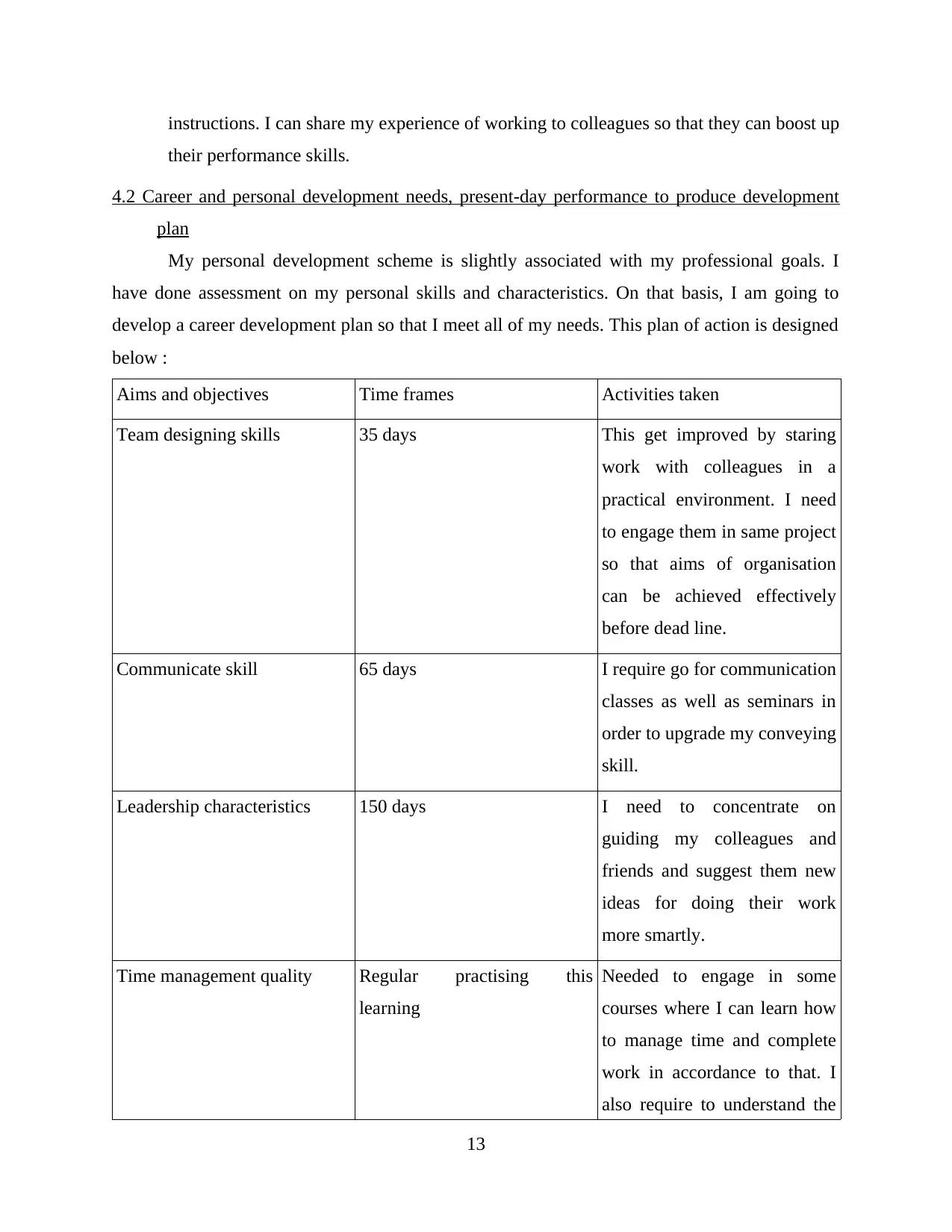
instructions. I can share my experience of working to colleagues so that they can boost up
their performance skills.
4.2 Career and personal development needs, present-day performance to produce development
plan
My personal development scheme is slightly associated with my professional goals. I
have done assessment on my personal skills and characteristics. On that basis, I am going to
develop a career development plan so that I meet all of my needs. This plan of action is designed
below :
Aims and objectives Time frames Activities taken
Team designing skills 35 days This get improved by staring
work with colleagues in a
practical environment. I need
to engage them in same project
so that aims of organisation
can be achieved effectively
before dead line.
Communicate skill 65 days I require go for communication
classes as well as seminars in
order to upgrade my conveying
skill.
Leadership characteristics 150 days I need to concentrate on
guiding my colleagues and
friends and suggest them new
ideas for doing their work
more smartly.
Time management quality Regular practising this
learning
Needed to engage in some
courses where I can learn how
to manage time and complete
work in accordance to that. I
also require to understand the
13
their performance skills.
4.2 Career and personal development needs, present-day performance to produce development
plan
My personal development scheme is slightly associated with my professional goals. I
have done assessment on my personal skills and characteristics. On that basis, I am going to
develop a career development plan so that I meet all of my needs. This plan of action is designed
below :
Aims and objectives Time frames Activities taken
Team designing skills 35 days This get improved by staring
work with colleagues in a
practical environment. I need
to engage them in same project
so that aims of organisation
can be achieved effectively
before dead line.
Communicate skill 65 days I require go for communication
classes as well as seminars in
order to upgrade my conveying
skill.
Leadership characteristics 150 days I need to concentrate on
guiding my colleagues and
friends and suggest them new
ideas for doing their work
more smartly.
Time management quality Regular practising this
learning
Needed to engage in some
courses where I can learn how
to manage time and complete
work in accordance to that. I
also require to understand the
13
Secure Best Marks with AI Grader
Need help grading? Try our AI Grader for instant feedback on your assignments.
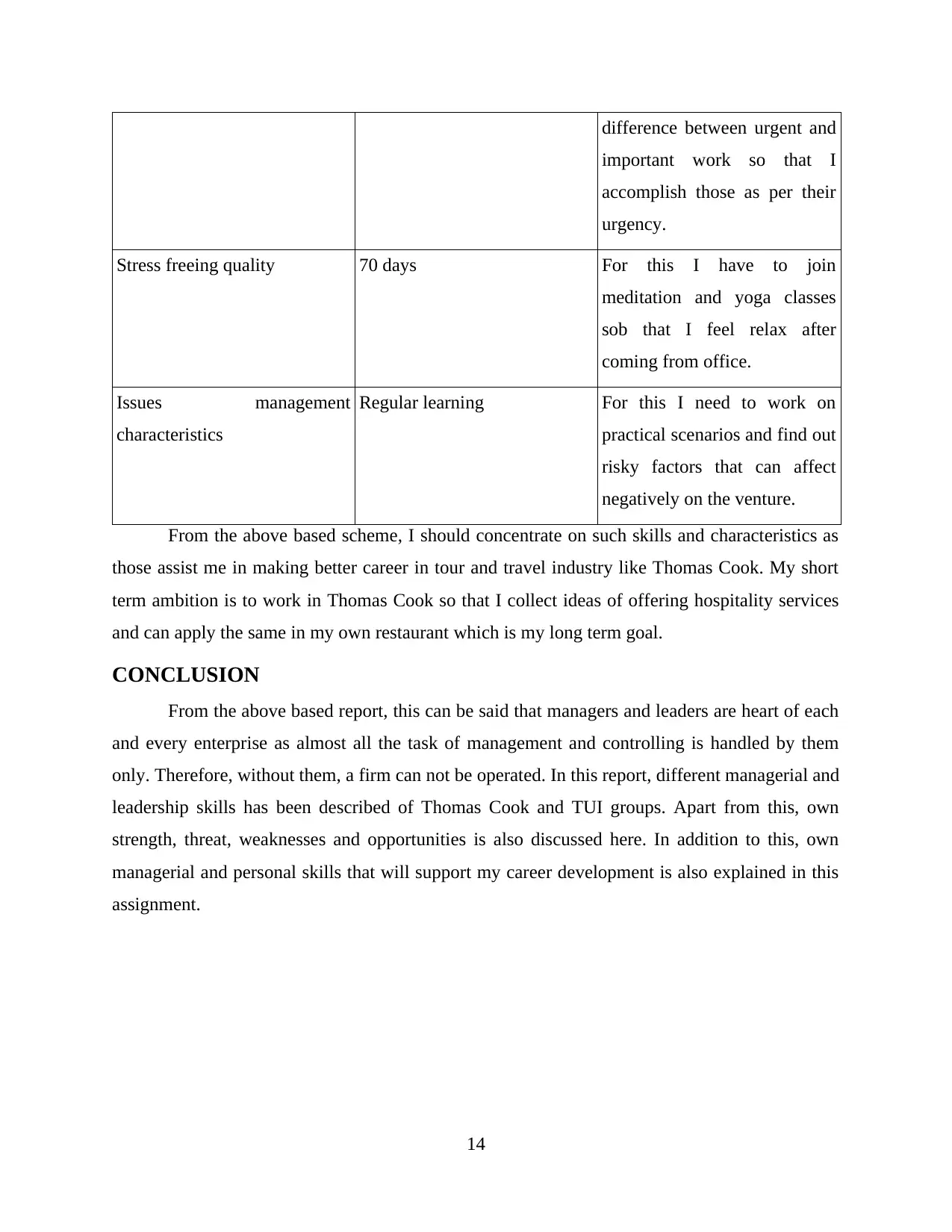
difference between urgent and
important work so that I
accomplish those as per their
urgency.
Stress freeing quality 70 days For this I have to join
meditation and yoga classes
sob that I feel relax after
coming from office.
Issues management
characteristics
Regular learning For this I need to work on
practical scenarios and find out
risky factors that can affect
negatively on the venture.
From the above based scheme, I should concentrate on such skills and characteristics as
those assist me in making better career in tour and travel industry like Thomas Cook. My short
term ambition is to work in Thomas Cook so that I collect ideas of offering hospitality services
and can apply the same in my own restaurant which is my long term goal.
CONCLUSION
From the above based report, this can be said that managers and leaders are heart of each
and every enterprise as almost all the task of management and controlling is handled by them
only. Therefore, without them, a firm can not be operated. In this report, different managerial and
leadership skills has been described of Thomas Cook and TUI groups. Apart from this, own
strength, threat, weaknesses and opportunities is also discussed here. In addition to this, own
managerial and personal skills that will support my career development is also explained in this
assignment.
14
important work so that I
accomplish those as per their
urgency.
Stress freeing quality 70 days For this I have to join
meditation and yoga classes
sob that I feel relax after
coming from office.
Issues management
characteristics
Regular learning For this I need to work on
practical scenarios and find out
risky factors that can affect
negatively on the venture.
From the above based scheme, I should concentrate on such skills and characteristics as
those assist me in making better career in tour and travel industry like Thomas Cook. My short
term ambition is to work in Thomas Cook so that I collect ideas of offering hospitality services
and can apply the same in my own restaurant which is my long term goal.
CONCLUSION
From the above based report, this can be said that managers and leaders are heart of each
and every enterprise as almost all the task of management and controlling is handled by them
only. Therefore, without them, a firm can not be operated. In this report, different managerial and
leadership skills has been described of Thomas Cook and TUI groups. Apart from this, own
strength, threat, weaknesses and opportunities is also discussed here. In addition to this, own
managerial and personal skills that will support my career development is also explained in this
assignment.
14
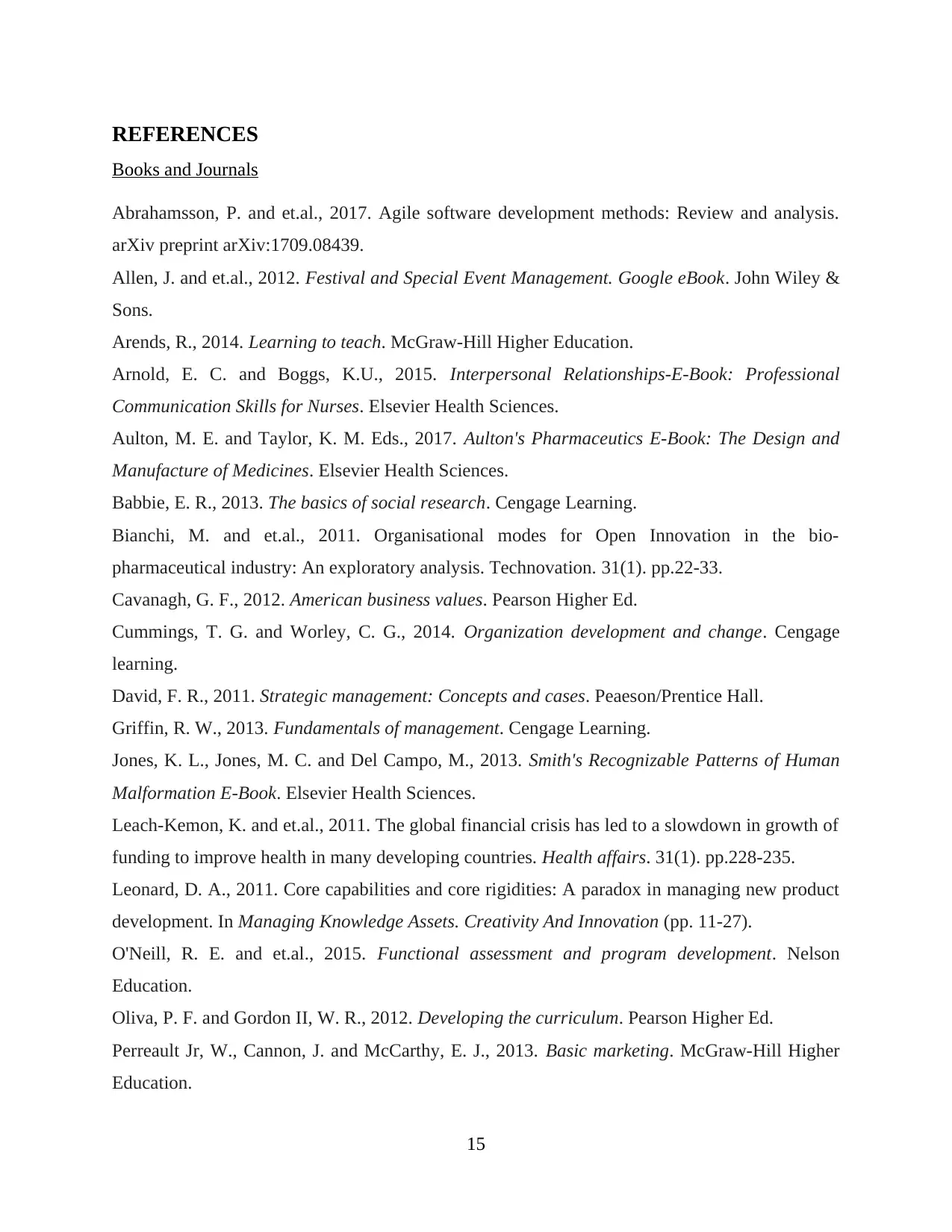
REFERENCES
Books and Journals
Abrahamsson, P. and et.al., 2017. Agile software development methods: Review and analysis.
arXiv preprint arXiv:1709.08439.
Allen, J. and et.al., 2012. Festival and Special Event Management. Google eBook. John Wiley &
Sons.
Arends, R., 2014. Learning to teach. McGraw-Hill Higher Education.
Arnold, E. C. and Boggs, K.U., 2015. Interpersonal Relationships-E-Book: Professional
Communication Skills for Nurses. Elsevier Health Sciences.
Aulton, M. E. and Taylor, K. M. Eds., 2017. Aulton's Pharmaceutics E-Book: The Design and
Manufacture of Medicines. Elsevier Health Sciences.
Babbie, E. R., 2013. The basics of social research. Cengage Learning.
Bianchi, M. and et.al., 2011. Organisational modes for Open Innovation in the bio-
pharmaceutical industry: An exploratory analysis. Technovation. 31(1). pp.22-33.
Cavanagh, G. F., 2012. American business values. Pearson Higher Ed.
Cummings, T. G. and Worley, C. G., 2014. Organization development and change. Cengage
learning.
David, F. R., 2011. Strategic management: Concepts and cases. Peaeson/Prentice Hall.
Griffin, R. W., 2013. Fundamentals of management. Cengage Learning.
Jones, K. L., Jones, M. C. and Del Campo, M., 2013. Smith's Recognizable Patterns of Human
Malformation E-Book. Elsevier Health Sciences.
Leach-Kemon, K. and et.al., 2011. The global financial crisis has led to a slowdown in growth of
funding to improve health in many developing countries. Health affairs. 31(1). pp.228-235.
Leonard, D. A., 2011. Core capabilities and core rigidities: A paradox in managing new product
development. In Managing Knowledge Assets. Creativity And Innovation (pp. 11-27).
O'Neill, R. E. and et.al., 2015. Functional assessment and program development. Nelson
Education.
Oliva, P. F. and Gordon II, W. R., 2012. Developing the curriculum. Pearson Higher Ed.
Perreault Jr, W., Cannon, J. and McCarthy, E. J., 2013. Basic marketing. McGraw-Hill Higher
Education.
15
Books and Journals
Abrahamsson, P. and et.al., 2017. Agile software development methods: Review and analysis.
arXiv preprint arXiv:1709.08439.
Allen, J. and et.al., 2012. Festival and Special Event Management. Google eBook. John Wiley &
Sons.
Arends, R., 2014. Learning to teach. McGraw-Hill Higher Education.
Arnold, E. C. and Boggs, K.U., 2015. Interpersonal Relationships-E-Book: Professional
Communication Skills for Nurses. Elsevier Health Sciences.
Aulton, M. E. and Taylor, K. M. Eds., 2017. Aulton's Pharmaceutics E-Book: The Design and
Manufacture of Medicines. Elsevier Health Sciences.
Babbie, E. R., 2013. The basics of social research. Cengage Learning.
Bianchi, M. and et.al., 2011. Organisational modes for Open Innovation in the bio-
pharmaceutical industry: An exploratory analysis. Technovation. 31(1). pp.22-33.
Cavanagh, G. F., 2012. American business values. Pearson Higher Ed.
Cummings, T. G. and Worley, C. G., 2014. Organization development and change. Cengage
learning.
David, F. R., 2011. Strategic management: Concepts and cases. Peaeson/Prentice Hall.
Griffin, R. W., 2013. Fundamentals of management. Cengage Learning.
Jones, K. L., Jones, M. C. and Del Campo, M., 2013. Smith's Recognizable Patterns of Human
Malformation E-Book. Elsevier Health Sciences.
Leach-Kemon, K. and et.al., 2011. The global financial crisis has led to a slowdown in growth of
funding to improve health in many developing countries. Health affairs. 31(1). pp.228-235.
Leonard, D. A., 2011. Core capabilities and core rigidities: A paradox in managing new product
development. In Managing Knowledge Assets. Creativity And Innovation (pp. 11-27).
O'Neill, R. E. and et.al., 2015. Functional assessment and program development. Nelson
Education.
Oliva, P. F. and Gordon II, W. R., 2012. Developing the curriculum. Pearson Higher Ed.
Perreault Jr, W., Cannon, J. and McCarthy, E. J., 2013. Basic marketing. McGraw-Hill Higher
Education.
15
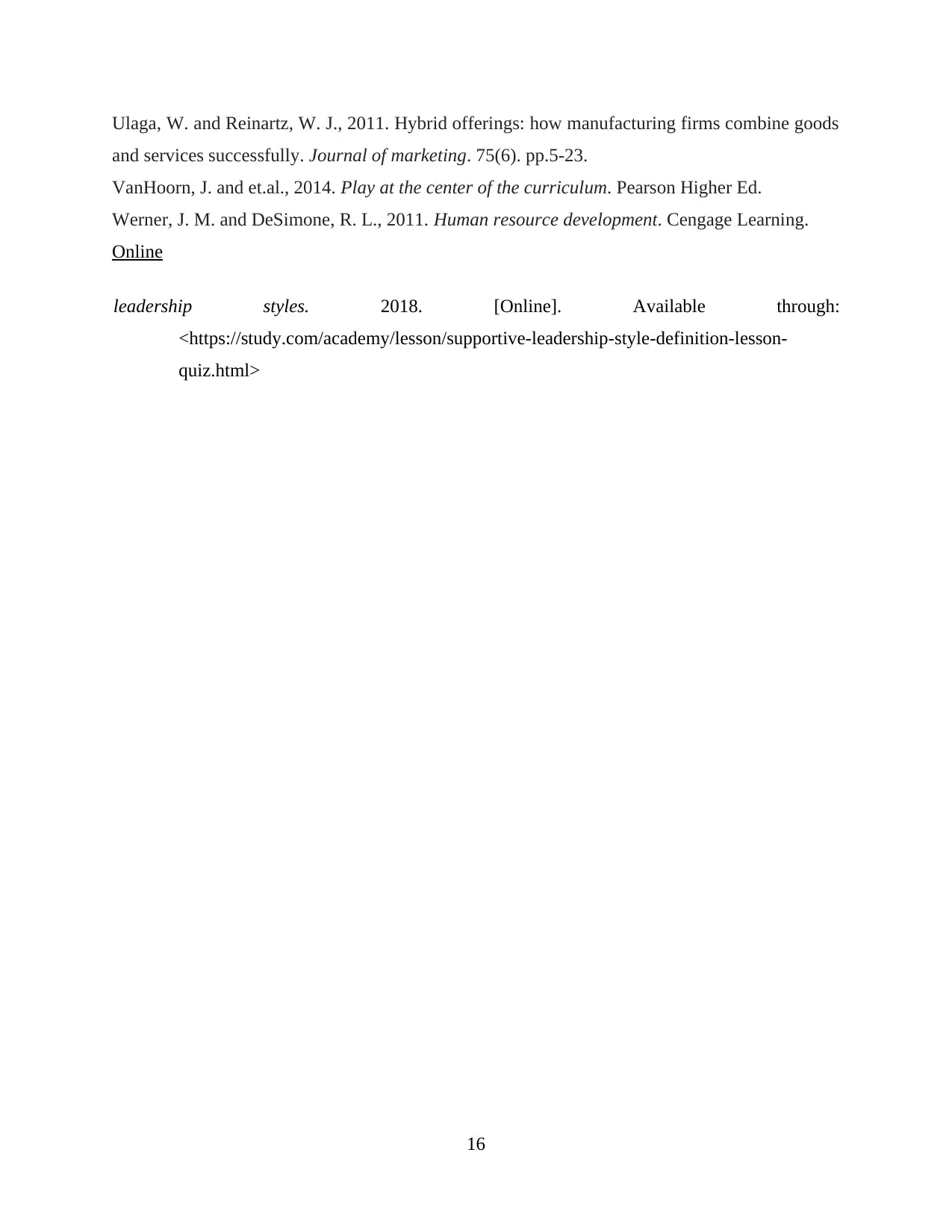
Ulaga, W. and Reinartz, W. J., 2011. Hybrid offerings: how manufacturing firms combine goods
and services successfully. Journal of marketing. 75(6). pp.5-23.
VanHoorn, J. and et.al., 2014. Play at the center of the curriculum. Pearson Higher Ed.
Werner, J. M. and DeSimone, R. L., 2011. Human resource development. Cengage Learning.
Online
leadership styles. 2018. [Online]. Available through:
<https://study.com/academy/lesson/supportive-leadership-style-definition-lesson-
quiz.html>
16
and services successfully. Journal of marketing. 75(6). pp.5-23.
VanHoorn, J. and et.al., 2014. Play at the center of the curriculum. Pearson Higher Ed.
Werner, J. M. and DeSimone, R. L., 2011. Human resource development. Cengage Learning.
Online
leadership styles. 2018. [Online]. Available through:
<https://study.com/academy/lesson/supportive-leadership-style-definition-lesson-
quiz.html>
16
1 out of 19
Related Documents
Your All-in-One AI-Powered Toolkit for Academic Success.
+13062052269
info@desklib.com
Available 24*7 on WhatsApp / Email
![[object Object]](/_next/static/media/star-bottom.7253800d.svg)
Unlock your academic potential
© 2024 | Zucol Services PVT LTD | All rights reserved.





